#but the bad things are connected to the narrative themes!
Note
Was Maes Hughes a good man? Was he a bad man?
Consider the evidence we have.........
Loaded question! I feel like the obvious answer is “yes!” because who doesn’t like Hughes? Who isn’t gutted by his death? Who doesn’t get sad thinking about his daughter growing up without the father who loved her so much?
But we also have to consider that Hughes canonically took part in the Ishval extermination—in other words, war crimes. The man’s a war criminal and a murderer. Even in the 03 version, where he states he took a desk job rather than participate in the massacre, he knew about the killings and did nothing to stop them. Complicity.
So then our answer should be “no,” because he Does Bad Things in canon. And—so does Roy Mustang. So does Riza Hawkeye, and every state alchemist and almost every enlisted soldier at the time of the war. They’re all part of a machine that steps on people. Slaughters then mercilessly when it’s deemed necessary. And anyone who follows those orders without question is, by definition, a bad person.
I’m not breaking new ground by saying this, and I’m far from the first to talk about the Amestrian military being almost entirely comprised of war criminals. But honestly? Whether or not someone is a “good” person is…such a boring question to me. The far more intriguing question is “Is Maes Hughes a good character?” And the answer to that is yes.
He’s a good character because he haunts the narrative. Because his death causes more ripples than his life. Because his friendship to one man helped cause the downfall of the regime he served, the regime that made him culpable in a genocide.
He’s a good character because, in the Conqueror of Shamballa movie, he makes us as viewers uncomfortable because he’s a Nazi. He’s complicit in that system of oppression as well, one that we’re far more familiar with. It might make viewers angry, make them decry the movie as bad because “ugh not my boy Hughes he would never!” Uh…he did. In his world, he did. In fact, in CoS, he is better than his Amestrian counterpart, because he denounces and leaves the party before they do anything more than shoot up a beer hall. Not a completely bad person, after all, so it seems.
#asks#anon#mymeta#i hope i articulated my thoughts well enough#like make no mistake i LIKE hughes#and i’m not gonna denounce him because he does bad things#but the bad things are connected to the narrative themes!#i have to talk about them!#fullmetal alchemist#maes hughes
14 notes
·
View notes
Note
“well, buggy fans are willing to forgive much worse behavior from other characters they ship him with, so that hasn't stopped me!”
And that’s the thing I kinda don’t like about buggy ships tbh. I don’t think I like them just because most of them are…. Extremely mean to Buggy? I never had favourite character like this. That’s why I kinda want just one person who would really liked my blorbo? Like does Buggy even has one genuine relationship rn? I was naive because I did thought of his crew as a little more genuine, and after marine ford my stupid brain did thought at least mr3 is not gonna left him the minute buggy out of picture. And Oda destroyed my hopes every single time. He’s not that unlikable in canon :(
(context)
yeah, you know, that's fair! some people like for their fave to suffer, and some want to protect them from the cruelty of the world. i'm somewhere in between, myself; i can enjoy a bit of buggy schadenfreude, but only if i feel like he really earned it, reaping what he sowed and all that.
…and tbh, i think this lack of genuine relationships is another reaping/sowing situation.
like, buggy had genuine connections in his youth and they all abandoned him (save one, but let's not get distracted by shuggy rn). is it any wonder he was disillusioned, and sought out bonds based on self-interest and false images of his own greatness?
when buggy was a moderately-sized fish in a small pond, he must have felt just as sure as you, anon, that he'd found the best possible crew this way. who needs sincerity or personal loyalty?! all you need is a badass facade and a common goal!
the downside to such superficial bonds only makes itself known when the illusion breaks down, or when it's no longer in someone's self-interest to support buggy.
#asked and answered#one piece#buggy#fwiw i do think the og buggy pirates care for him#but they're the same east blue guys they always were… tf can they do against guys with billion berry bounties#well they aren't getting beaten up by those guys so it's easier for them to be content with the current state of things#anyway. imo this is one of the themes of one piece rearing its head.#luffy's got sincere connections everywhere because he is straightforward and caring and powerful & ppl respond to that#(ditto koby! though he seems unaware of his impact & influence)#blackbeard is straightforward about his *lack* of care & has a lot of indifferent or fearful followers who just want a taste of his power#seems like that could break bad real easily but it hasn't just yet#buggy lies about caring and his power & has both sincere followers (lie-believers) and opportunistic coattail riders (lie-disbelievers)#& that situation *has* broken bad a bit! but mihawk knew what he was doing when he suggested maintaining the facade#*buggy’s bad choices#*the power of friendship#*narrative foils#*ppl being mean to buggy#*pragmatic characters
6 notes
·
View notes
Text
Disney's Wish
Look, Disney's Wish has been universally panned across the internet, and for good reason.
It’s just…kind of okay.
When we sit down to watch a Disney film—you know, from the company that dominated the animation industry from 1989 to (arguably) the mid 2010’s and defined the medium of animation for decades—we expect something magnificent. Now, I could sit here and tell you everything that I thought was wrong with Wish, but if you’re reading this review, then I imagine that you’ve already heard the most popular gripes from other users across the web. So, let me focus in:
The biggest problem with Wish—in fact, the only problem with Wish—is Magnifico.
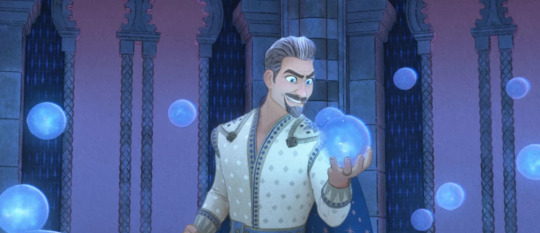
Whoa, that’s crazy! There’re so many things about Wish that could’ve been better! The original concept was stronger! The music was bad--
I hear you, I do. But stay with me here, okay? Take my hand. I studied under artists from the Disney renaissance. I teach an adapted model of Disney’s story pipeline at a University level. I spent a ridiculous amount of time getting degrees in this, and I am about to dissect this character and the narrative to a stupid degree.
First, we need to understand that a good story doesn’t start and end with what we see on the screen. Characters aren’t just fictional people; when used well, characters are tools the author uses (or in this case, the director) to convey their message to the audience. Each character’s struggle should in some way engage with the story’s message, and consequently, the story’s theme. Similarly, when we look at our protagonist and our antagonist, we should see their characters and their journeys reflected in one-another.
So, what went wrong between Asha & Magnifico in terms of narrative structure?
Act I
In Wish, we’re introduced to our hero not long into the runtime—Asha. She’s ambitious, caring, and community-oriented; in fact, Asha is truly introduced to the audience through her love of Rosas (in “Welcome to Rosas”). She’s surrounded by a colorful cast of friends who act as servants in the palace, furthering her connection with the idea of community but also telling us that she’s not of status, and then she makes her way to meet Magnifico for her chance to become his next apprentice.
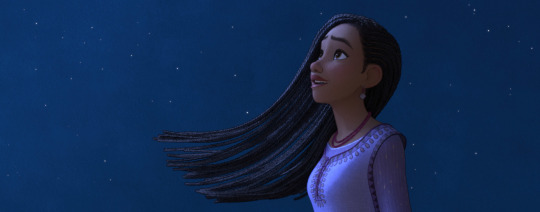
Quick aside: I'm not going to harp on Asha as a character in the context of Disney's overall canon. Almost every review I've seen covers her as a new addition to Disney's ever-growing repertoire of "Cute Quirky Heroines", and I think to be fair to Asha as an actor in the narrative, it serves her best to be weighed within the context of the story she's part of.
As Asha heads upstairs for her interview, we're introduced to the man of the hour: Magnifico. He lives in a tower high above the population of Rosas, immediately showing us how he differs from Asha; he’s disconnected from his community. He lives above them. He has status. While the broader context of the narrative wants us to believe that this also represents a sense of superiority, I would argue that isn’t what Magnifico’s introduction conveys; he's isolated.
Despite this distance, he does connect with Asha in “At All Costs”. For a moment, their goals and values align. In fact, they align so well that Magnifico sees Asha as someone who cares as much about Rosas as he does, and almost offers her the position.
… Until she asks him to grant Saba’s wish.
This is framed by the narrative as a misstep. The resonance between their ideals snaps immediately, and Magnifico says something along the line of “Wow. Most people wait at least a year before asking for something.”
This disappointment isn't played as coming from a place of power or superiority. He was excited by the idea of working with someone who had the same values as he did, who viewed Rosas in the same way he does, and then learns that Asha’s motivations at least partially stem from a place of personal gain.
Well, wait, is that really Asha's goal?
While it's not wholistically her goal, it's very explicitly stated & implied that getting Saba's wish granted is at least a part of it. The audience learns (through Asha's conversation with her friends before the interview) that every apprentice Magnifico has ever had gets not only their wish granted, but the wishes of their family, too! Asha doesn’t deny that this is a perk that she’s interested in, and I don't think this is a bad thing.
So, Is Asha’s commitment to Saba selfless, or selfish? I’m sure the director wanted it to seem selfless, wherein she believes her family member has waited long enough and deserves his wish granted, but we can’t ignore the broader context of Asha essentially trying to… skip the line.

Then, we get our first point of tension. Magnifico reveals his “true colors” in snapping at Asha, telling her that he “decides what people deserve”. This is supposed to be the great motivator, it’s meant to incite anger in the audience—after all, no one gets to decide what you deserve, right? But unfortunately for the integrity of the film and the audience's suspension of disbelief, at least part of Magnifico’s argument is a little too sound to ignore:
Some wishes are too vague and dangerous to grant. Now, there’s visual irony here; he says this after looking at a 100 old man playing the lute. The idea that something so innocuous could be dangerous is absurd, and the audience is meant to agree.
... But we’ve also seen plenty of other wishes that might be chaotic—flying on a rocket to space, anyone? The use of the word vague is important, too—this implies wording matters, and that a wish can be misinterpreted or evolve into something that is dangerous even if the original intent was innocuous. His reasoning for people forgetting their wish (protecting them from the sadness of being unable to attain their dreams) is much weaker, but still justifiable (in the way an antagonist’s flawed views can be justified). The film even introduces a facet of Magnifico’s backstory that implies he has personal experience with the grief of losing a dream (in the destruction of his home), but that thread is never touched on again.
�� What is the audience supposed to take from this encounter? If we’re looking at the director’s intent, I’d argue that we’ve been introduced to a well-meaning young girl and a king who’s locked away everyone’s greatest aspiration because he believes he deserves to have the power to decide who gets to be happy.
But what are we shown? Our heroine, backed by her friends, strives to be Magnifico’s apprentice because she loves the city but also would really like to see her family's wishes granted. When this request is denied and she loses the opportunity to be his apprentice, she deems Magnifico’s judgement unfair & thus begins her journey to free the dreams of Rosas’ people.
In fairness, Magnifico doesn’t exhibit sound judgement or kindness through this act of the film. He’s shown to be fickle, and once his composure cracks, he can be vindictive and sharp. He's not a good guy, but I'd argue he's not outright evil. He's just got the makings of a good villain, and those spikes of volatility do give us a foundation to work off of as he spirals, but as we’ll discuss in a bit, the foreshadowing established here isn’t used to the ends it implies.
While I was watching this film, I was sure Magnifico was going to be a redeemable villain. He can’t connect with people because he's sure they value what he provides more than they value him (as seen in “At All Costs” and the aftermath), and Asha’s asking for more was going to be framed as a mistake. His flaw was keeping his people too safe and never giving them the chance to sink or swim, and he's too far removed from his citizens to see that he is appreciated. Asha does identify this, and the culmination of her journey is giving people the right to choose their path, but the way Magnifico becomes the “true” villain and his motivations for doing so are strangely divorced from what we’re shown in Act I.
Act II:
His song, “This is the Thanks I Get!?” furthers the idea that Magnifico’s ire—and tipping point—is the fact that he thinks the people he’s built a kingdom for still want more. Over the course of this 3:14 song, we suddenly learn that Magnifico sends other people to help his community and doesn’t personally get involved (we never see this outside of this song), and that he’s incredibly vain/narcissistic (he's definitely a narcissist). I think feeling under-appreciated is actually a very strong motivation for Magnifico as a character-turning-villain, and it works very well. It’s justified based on what we’ve seen on screen so far: he feels under-appreciated (even though he’s decidedly not—the town adores him), he snaps and acts irrationally under stress (as seen with his outburst with Asha), and he’s frustrated that people seem to want more from him (again, as seen with his conversation with Asha in Act I).
But then… he opens the book.
Ah, the book. As an object on screen, we know that it's filled with ancient and evil magic, well-known to be cursed by every relevant character in the film, and kept well-secured under lock and key. But what does it stand for in the context of the narrative's structure? A quick path to power? We're never told that it has any redeeming qualities; Magnifico himself doesn't seem to know what he's looking for when he opens it. It feels... convenient.
I think it's also worth noting that he only turns to the book when he's alone; once again, the idea of connection and community rears it's ugly head! Earlier in the film, Amaya-- his wife-- is present and turns him away from taking that path. In her absence, he makes the wrong choice.
This decision could make sense; it contains powerful magic, and if it were framed in such a way that the people of Rosas were losing faith in Magnifico’s magic, as if what he can do might not be enough anymore after what they felt from Star, going for the book that we know contains spells that go above and beyond what he can already do would be logical. Along the lines of, “If they’re not happy with what I do for them, fine. I, ever the “martyr”, will do the unthinkable for you, because you want more.”

It would keeps with the idea that Magnifico believes he's still trying to help people, but his motivation has taken his self-imposed pity party and turned it into resentment and spite.
But, that’s not the case. Instead he talks about reversing that “light”, which has had no real negative or tangible consequences on Rosas. Everyone had a warm feeling for a few seconds. Again, it’s meant to paint him as a vain control freak, but… he hasn’t lost any power. The citizens of Rosas even assume the great showing of magic was Magnifico.
Act III
Then, we get to the consequences of opening the book (and perhaps my biggest qualm with this film). The book is established as being cursed. Magnifico knows it, Asha knows it, and Amaya—who is introduced as loyal-- knows it. The characters understand his behavior is a direct result of the book, and search for a way to save him. This is only the focus of the film for a few seconds, but if you think about it, the fact that his own wife cannot find a way to free him of the curse he’s been put under is unbelievably tragic. Worse still, upon discovering there is no way to reverse the curse, Magnifico—the king who built the city & “protected it” in his own flawed way for what seems to be centuries—is thrown out by his wife. You know, the wife who's stood loyal at his side for years?
It’s played for laughs, but there’s something unsettling about a character who’s clearly and explicitly under the influence of a malevolent entity being left… unsaved. If you follow the idea of Magnifico being disconnected from community being a driving force behind his arc, the end of the film sees him in a worse situation he was in at the start: truly, fully alone.
They bring in so many opportunities for Magnifico to be sympathetic and act as a foil for Asha; he’s jaded, she’s not. He’s overly cautious (even paranoid), she’s a risk-taker. He turns to power/magic at his lowest point, Asha turns to her friends at her lowest point. Because this dichotomy isn’t present, and Magnifico—who should be redeemable—isn’t, the film is so much weaker than it could’ve been. The lack of a strong core dynamic between the protagonist and antagonist echoes through every facet of the film from the music to the characterization to the pacing, and I believe if Magnifico had been more consistent, the film would’ve greatly improved across the board.
I mean, come on! Imagine if at the end of the film, Asha—who, if you remember, did resonate with Magnifico’s values at the start of the film—recognizes that he's twisted his original ideals and urges him to see the value in the people he’s helped, in their ingenuity, in their gratitude, & that what he was able to do before was enough. Going further, asking what his wish is or was—likely something he’s never been asked— and showing empathy! We’d come full circle to the start of the film where Asha asks him to grant her wish.
Pushing that further, if Magnifico’s wish is to see Rosas flourish or to be a good/beloved king, he'd have the the opportunity to see the value in failing and how pursuing the dream is its own complex and valuable journey, and how not even he is perfect.
The curse and the book (which, for the purposes of this adjustment, would need to be established as representing the idea of stepping on others to further your own goals/the fast way to success), then serve as the final antagonist, that same curse taking root in the people of Rosas who’ve had their dreams destroyed, and Asha works with the community to quell it. Asha’s learned her lesson, so has Magnifico, and the true source of evil in the film—the book—is handled independently. Magnifico steps back from his role as King, Amaya still ends up as Queen, and Asha takes her place as the new wish-granter.
This route could even give us the true “Disney villain” everyone’s craving; giving the book sentience and having it lure Magnifico in during “This is the Thanks I Get!?” leaves it as its own chaotic evil entity.
All in all, Magnifico's introduction paved a road to redemption that the rest of the film aggressively refused to deliver on, instead doubling down on weaker motivations that seem to appear out of thin air. Once the audience thinks, hey, that bad guy might have a point, the protagonist has to do a little more heavy lifting to convince us they're wrong.
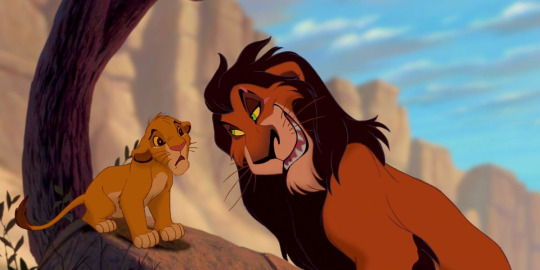
Look at the big-bad-greats from Disney's library. There isn't a point in the Lion King where we pause and think, "Wait a second, maybe Scar should be the guy who rules the Pridelands." Ursula from the Little Mermaid, though motivated by her banishment from King Triton's Seas, never seems to be the right gal for the throne. Maybe Maleficent doesn't get invited to the princess's birthday party, but we don't watch her curse a baby and think, Yeah, go curse that baby, that's a reasonable response to getting left out.
What do they all have in common? Their motivation is simple, their goal is clear, and they don't care who they hurt in pursuit of what they want.
Magnifico simply doesn't fall into that category. He's motivated by the idea of losing power, which is never a clear or impactful threat. His goal at the start seems to be to protect Rosas, then it turns into protecting his own power, and then-- once he's corrupted-- he wants to capture Star. The problem is, there's no objective to put this power toward. Power for power's sake is useless. Scar craves power because he feels robbed of status. Ursula believes the throne is rightfully hers. Maleficent wanted to make a statement. Magnifico... well, I'm not really sure.
1K notes
·
View notes
Note
can you elaborate on the reasons ? what criticisms do you disagree with?
criticisms i disagree with:
"they character assassinated jane" amiguita there was no character to assisnate.
"they character assassinated dirk" dirk is at his most interesting and likeable ever and is just about the only redeeming thing about these
"they were just written to spite the fans" if true tht would have been Epic, and Based. but they very obviously werent
"its too violent and sexual for cheap shock humour" did you. read homestuck, the web comic? what were you Expecting... also like it or not the sexual content isnt just random or gratuitous it is obviously trying to be a conclusion to the whoel coming-of-age theme of homestuck as a work.
"so-and-so is out of character" homestuck characters are malleable little dolls that can be rearranged to suit the narrative at a whim. this is true about all fictional characters ofc but it is like explicitly textually metaphysically true in homestuck
my criticisms:
the heavy-handed political messaging is fucking tedious and awful and so profoundly of its time in a bad way. its clearly a reaction to trump but it doesnt have anything interesting to say about him or fascism or racism or anything, really, except, um. Cheeto in the white house?. the whole Evil Jane plot is too stupid and contrived for the sake of the satire to take seriously but also its awful satire written by liberals who think fascism as invented in 2016 by the orange man
god can we fucking talk about how fucking embarassing the obama shit is. jesus fucking christ. for a start it's a callback to a running jhoke in homestuck that is straight up just super racist. and they decide to pivot from the joke being 'its funny that theres a black president', which is good, but they pivot it to 'obama seems so heroic and magical now that we're stuck with the Orange Man', which, admittedly, is better than Being Racist, but also sucks shit. he killed people amiguitas.
'post-canon' is cheap bullshit. like, the work makes a big deal about tryng to talk about What Canon Is, without ever acknowledging the concept of, like, IP law. claiming to just be a non-canon continuation like any other when it's made by people with the Official Exclusive Legal Rights just feels hollow and detooths any liberatory/deconstructive potential there. unironically my opinion of it would go up like tenfold if it had been actually published in AO3 instead of just joking about it.
in general i think that all of the attempt to deconstruct fiction or storytelling is rooted in a really weird and flawed model of storytelling. a lot of it seems to be taking an extremely long route to writing something bad on purpose and then saying 'see, if you wrote something like this, it would be bad'. Okay. i like deconstructive collapsing narrative shit in e.g. if on a winter's night a traveller because i think calvino has trenchant and interesting insights about literature and storytelling. i do think hussie also has those but they essentially dropped and explored all of them in homestuck and the epilogues just seem like an attempt to connect ohomstuck's disparate and contradictory approaches to Narrative into one overarching schemata and then crtiique that schemata, which i think is a doomed project that results in little of interest to me.
191 notes
·
View notes
Text
Why “Hiding in the Light” Didn’t Work: Stranger Things’ Psychospiritual Implications
Supplementary Sources: Jungian Theory & A Wrinkle In Time
Alright, buckle in. I’m running on a year’s worth of spiritual awakening, deep dives into Jungian theory and non-dualism, and my own ego’s primary coping mechanism: immersing myself in media as escapism. The purpose of this analysis is to break down the themes of non-dualism and light/darkness in ST (and maybe predict some character arcs), and also to position the narrative of ST as a psychospiritual wake-up call.
For some context: last year, I discovered the work of psychoanalyst (or philosopher, depending on who you’re talking to) Carl Jung. He had a pretty extensive theory about the human psyche that I immediately connected to the themes throughout Stranger Things, specifically Vecna’s mind control and curse. I’m going to break Jung’s theory down as succinctly as I can, and then delve into how it plays out in our favorite gay monster show.
But before I delve into Jung’s ideas, I also think it’s important to define selfhood (you’ll understand why in a minute). For the purposes of this analysis, the experience of the “self” is an illusion created by our senses, perceptions, memories, and consciousness, all of which are impermanent. Therefore, the self is what we call “conditioned.” There is no you or me, just the ideas we have of ourselves.
Now, we can get into Jung’s theory. He posited the following:
1. Every individual has a “persona” they show the world (a constructed self) to feel like they belong. Underneath this persona, everyone has a personal “shadow,” or the part of themselves they don’t want to acknowledge. This shadow is always projected onto others— every negative thought we have about someone else is a product of our own unintegrated shadow. Note: The shadow is NOT bad, it just “is.” It’s actually there to HELP us grow and integrate all the unhealed parts of us.
2. Individuals’ shadows are usually part of their unconscious, meaning most people are not aware of their shadow side or cannot bear to delve into their trauma/darkness and begin to heal it.
3. All of human consciousness is CONNECTED. This means two things. 1: There is a “collective unconsciousness” that contains the sum of all of our unintegrated trauma, and 2: We can heal our collective unconsciousness by healing our own unconsciousness.
How do we heal our own unconsciousness? By becoming AWARE of our shadow side, accepting and forgiving the conditioning that created it, and working to encourage others to do the same.
What— or rather, who— does that remind you of?
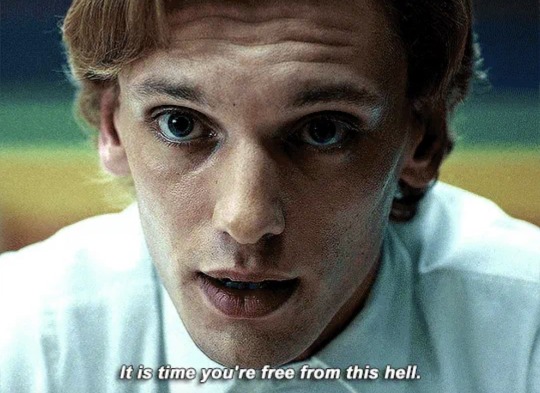
Also— great use of lighting here.
We know Vecna has direct access to his victims’ consciousness; not just their memories, cognition, and emotions, but also their awareness itself. This is how he’s able to target and trance people. But it’s not just their consciousness Vecna has access to; it’s their unconsciousness. Their shadow. Their trauma. Yes, he has psionic abilities akin to El’s, but as far as we know, El can’t access the collective unconsciousness like Vecna can. She is only capable of “remote viewing” via the void or piggybacking into people’s minds. So why is Vecna capable of this?
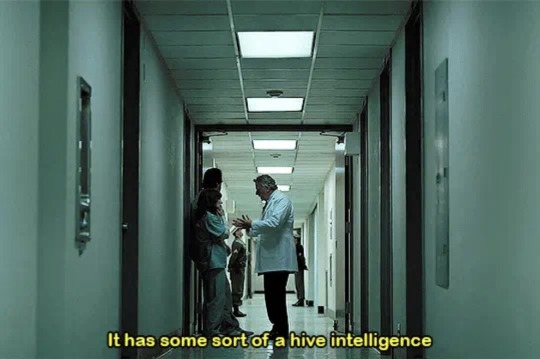
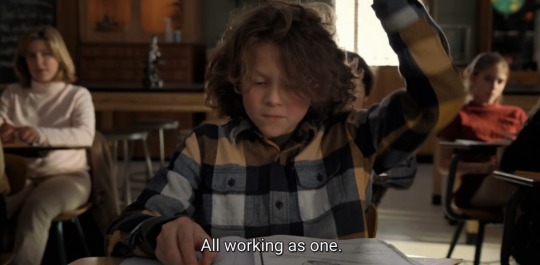
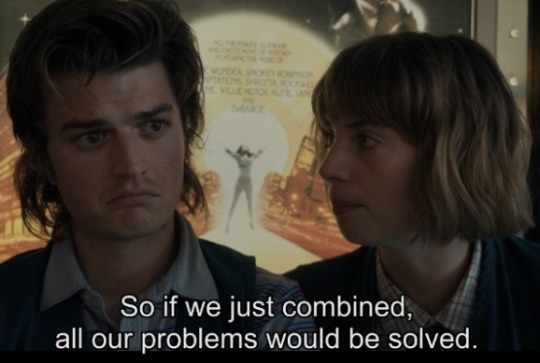
If you want my take on it: the only way to access a collective shadow would be through accessing your own shadow. So is Vecna really Henry, or his unintegrated shadow? And is either really condemnable, considering the larger themes of the show?
We see this theme of non-dualism echoed in Brenner’s NINA pep talk with El:
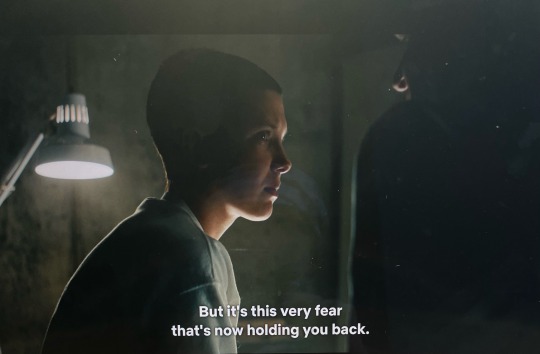
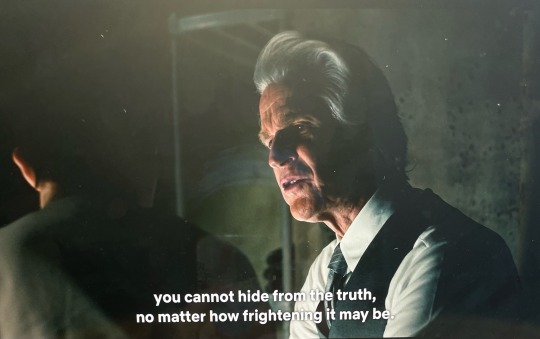
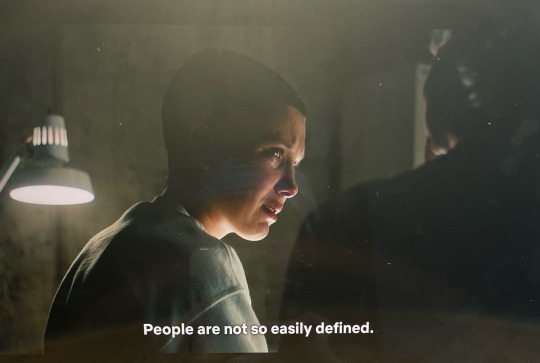
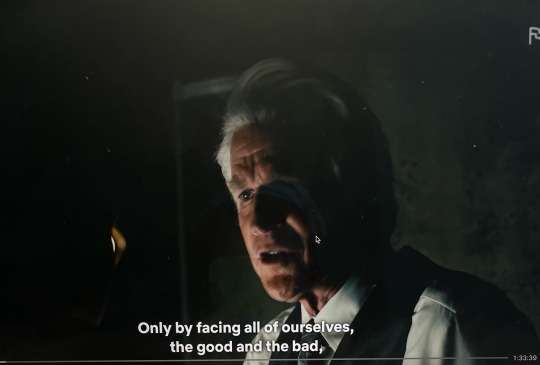
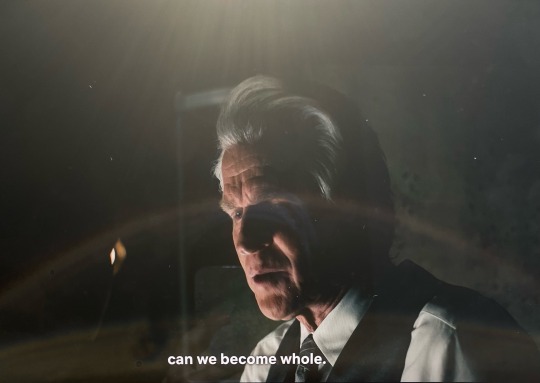
It’s fascinating to me that they’re communicating these bigger thematic ideas through the show’s “villians”— while the above conversation could be taken at surface-level as Brenner being manipulative, it’s important to acknowledge the truth of what he’s saying. NINA is only successful because El faces “the good and the bad.” This is why “hiding in the light” is a no-go for Max.
Focusing only on happy memories is a form of emotional bypassing. Throughout the show, we’ve been told time and again that hiding doesn’t work. Neither does running away. The only way out for our characters is through their own shadows.
Now, the fun part: predictions. Looking at all of this with a Jungian lens, it doesn’t make much sense to villianize a character or to end the story by “defeating evil.” In non-dual theory, there are no evil people, only unhealed ones.
We know what worked for our characters temporarily (Will in the UD, Max in her first trance, El using her powers against Vecna) was the memory and vibration of love.
This reminded me of A Wrinkle In Time, which is a science fiction novel that’s been noted more than a few times as one of Stranger Things’ primary influences. In the book, a girl and her brother travel through time to rescue their father from an alternate dimension where all beings are controlled in a hyper-individualist suburbia by a giant, all-knowing brain. The climactic “defeat” of the brain is shockingly simple, but incredible impactful— Meg, the heroine, tells it over and over that she loves it. This love ultimately brings her father and brother out of trances they are in, and they’re able to remember her and travel back home.
(Tangent: And God. The implications of that, outside of analyzing ST, are powerful. How do we live in a capitalist hellscape that is so caught up in the mind— in acheiving, obtaining, securing, protecting the ego— that many of us have forgotten our hearts? The answer is love. Loving ourselves more deeply to love all beings more deeply, “the good and the bad.” But love does not negate accountability, and it does not excuse harm.)
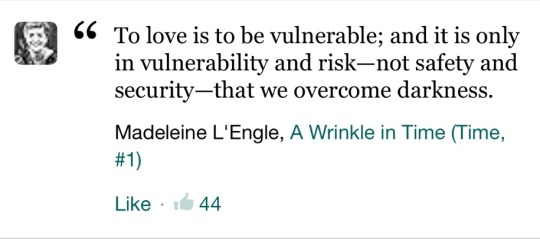
Our characters are all struggling with self-acceptance and self-love in some form or another. Each is wrestling with secrets and lies, and the desire to hide parts of themselves they think others can’t accept.
Mike is clearly struggling with self-loathing, guilt surrounding what happened to El in s1, and a crippling hero complex.
Will is also on the self-loathing train, continually self-sacrifices to his own detriment, and is hiding his identity out of fear (not at all villifying that, just for the record.)
El struggled to reconcile her abilities and forced weaponization with her identity outside of the lab pre-s4.
Max was suicidal and had a lot of self-hatred after B*lly’s death.
Nancy parallels Mike in her survivor’s guilt post-s1 and exhibits the same lack of self-preservation and self-sacrificing tendencies.
You get my point. So how will these characters overcome their trauma? Not through hiding, or running, or bypassing. Not through the light alone. Through love— acknowledgement of their own darkness, compassion for the unhealed nature of others, and commitment to being honest with themselves and their loved ones. We know Will is El and Henry’s mirror/foil and will play a central role in S5, and with all of this in mind I think it’s safe to say he will break the cycle of bypassing and hiding from trauma and pain once and for all. He won’t fight it like El, hide from it like Max, or run from it like he did as a kid.
Only by integrating their shadows can our characters become truly “themselves,” or as Brenner puts it, “whole.”
I will probably have much more to say about this after my re-read of A Wrinkle in Time, but for now, that’s all I’ve got. :) Hope everyone is doing well!
#i dont normally do posts like this but my brain has been whirring lately#stranger things#byler#mike wheeler#will byers#vecna#henry creel#st5 speculation#st analysis#stranger things analysis
156 notes
·
View notes
Text
Katsuki as the Light & Izuku as the Dark- Love and Harmonious Totality in The New Era
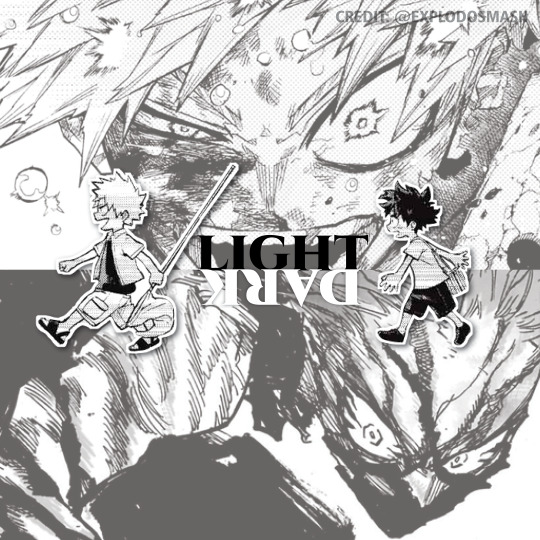
This meta analysis’ purpose is to make the case for KT/DK existing as Light and Dark in each other’s stories respectively, and explain how this dichotomy challenges black & white thinking in the narrative.
This meta analysis will also explore how this Light/Dark dichotomy lays the groundwork for why Katsuki/Izuku as a unit represent a “New Era" in the story.
[Can also be found on twitter]
Whether by Save to Win/Win to Save, or the fact they are osananajimi, the story frequently draws our attention back to Katsuki and Izuku’s complicated, influential and powerful bond. Despite all the changes they’ve gone through in MHA up until now, both individually and together, one thing has always remained constant: they are as symbolically connected as they are physically/mentally/emotionally.
We argue that one of the ways MHA’s narrative connects them symbolically as polar, balanced parts of a larger whole is through a sense of DUALITY.
Furthermore, we argue that the use of contrasting Light/Dark motifs act as both visual and text metaphor to create this duality, with Katsuki representing Light and Izuku representing Dark.
It's important to note that by Light/Dark, we aren’t referring to their moral clarity, goodness or badness. Rather, we will explore Light/Dark as a metaphor that builds on themes in MHA while creating tension (contrast, conflict leading, fear and rejection) and harmony (balance, unity, love and acceptance).
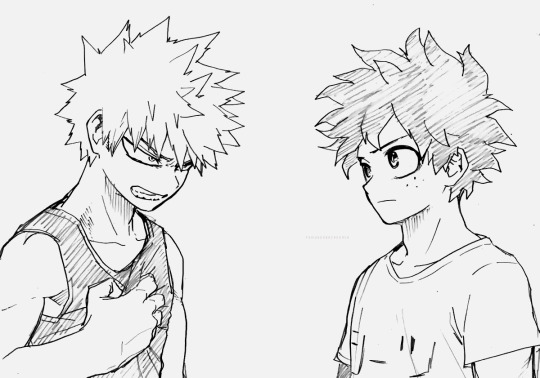
Note: the Light and Dark comparisons/metaphors between Katsuki and Izuku used in MHA sometimes get lost in translation in the anime. Here are some examples….
For Izuku:
Izuku is often encased in shadows in Katsuki’s POV since the beginning.
The word used for quirk (kosei) meaning “personality”, with quirkless meaning “lack of personality”, evoking the absence of something
Character design leaning on “dark” shades (dark/filled in hair, eyes including dark pupils early in the series)
Izuku’s “Dark Hero” arc as it’s officially titled.
Izuku’s prototype/beta name “Yamikumo” meaning Dark Cloud and his personality type tending toward facades/anxiousness
Blackwhip being the OFA quirk that resonates with Izuku’s emotions (particularly his rage)
His recent “power up” moment in the current arc involving blackwhip is denoted by claws, fangs and black tendrils. This form is officially called “overlay” but Hori also calls it “carnage” in his head.
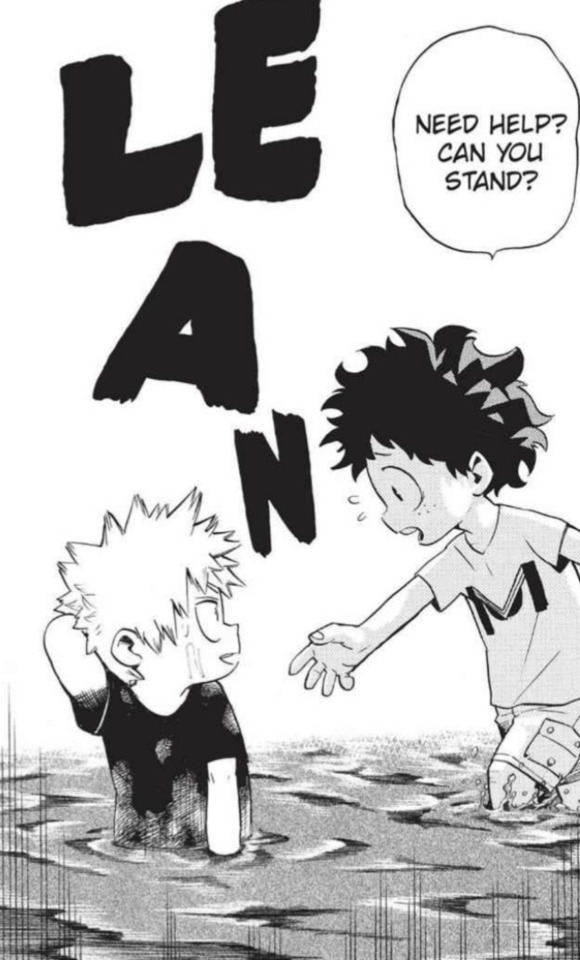
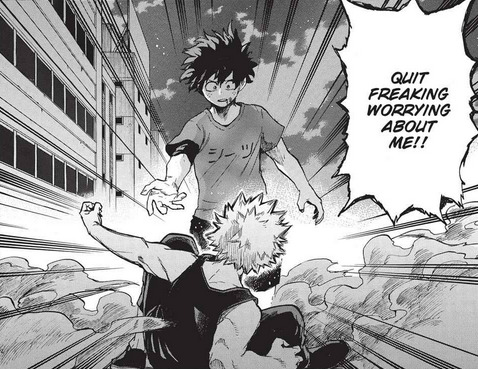
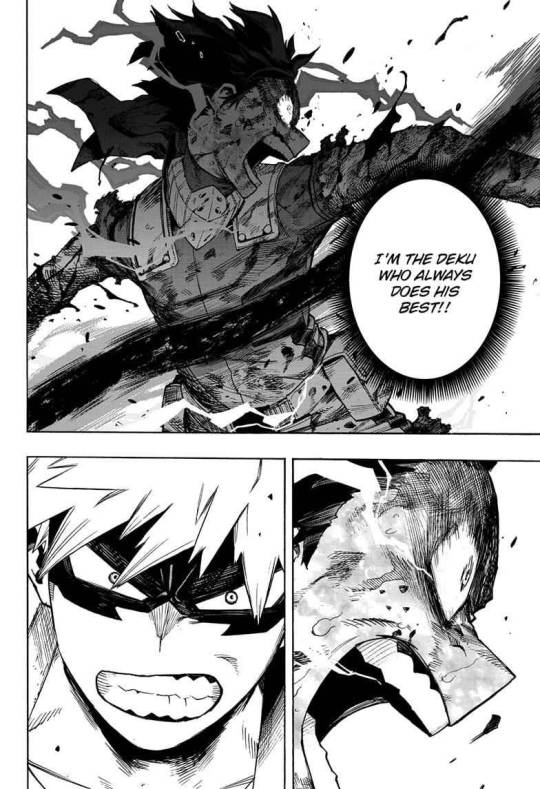
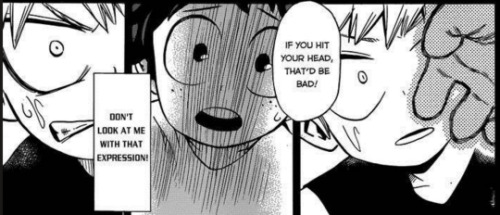
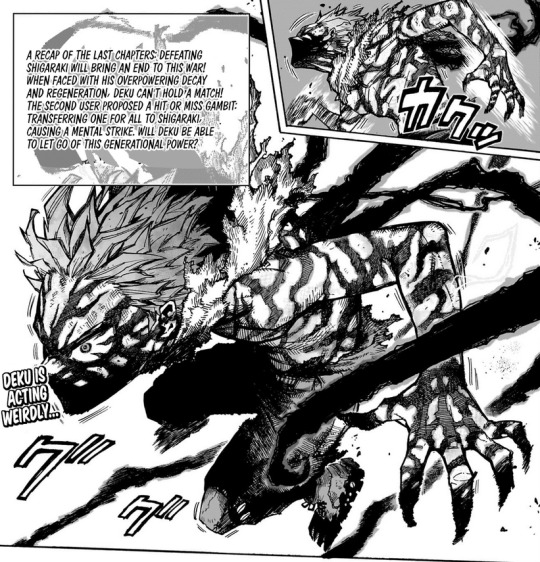
And for Katsuki:
Izuku’s description of Katsuki as someone bright and blinding, often bringing light into his eyes as an artistic consistency.
His quirk “explosion” emitting light, his move “stun grenade” literally a blinding flash of light.
Character design leaning on “light” shades (light hair, eyes aren’t filled in)
Prototype/beta ‘Gogo’ Katsuki’s light clothing and his personality type overall being bubbly and overprotective (toward Yamikumo).
Katsuki’s death chapter titled “Light Fades to Rain”, and his revival evoking that visual of a bright light.
His recent “power up” moment in the current arc is denoted by flashing lights and explosions all around his body - highlighted with laughter, and glee.
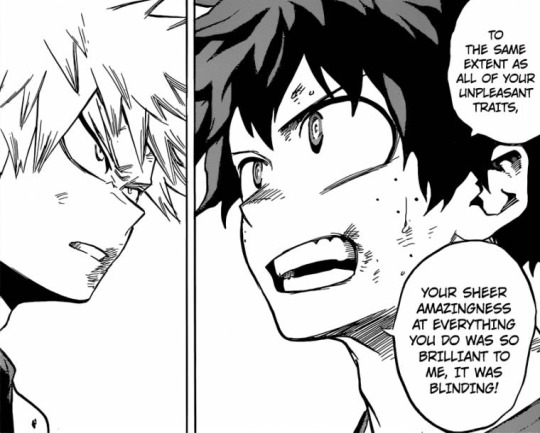
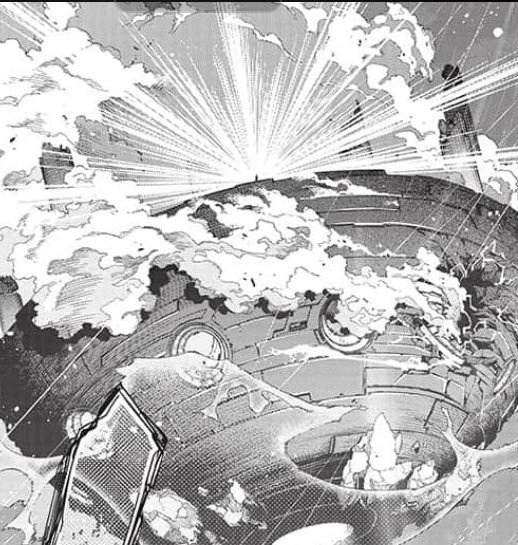
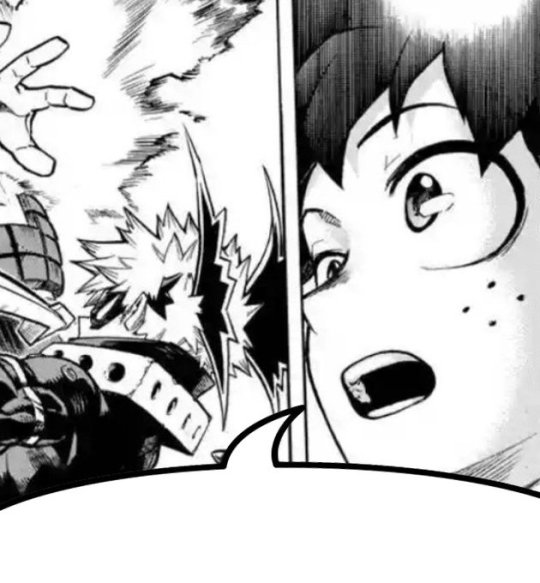
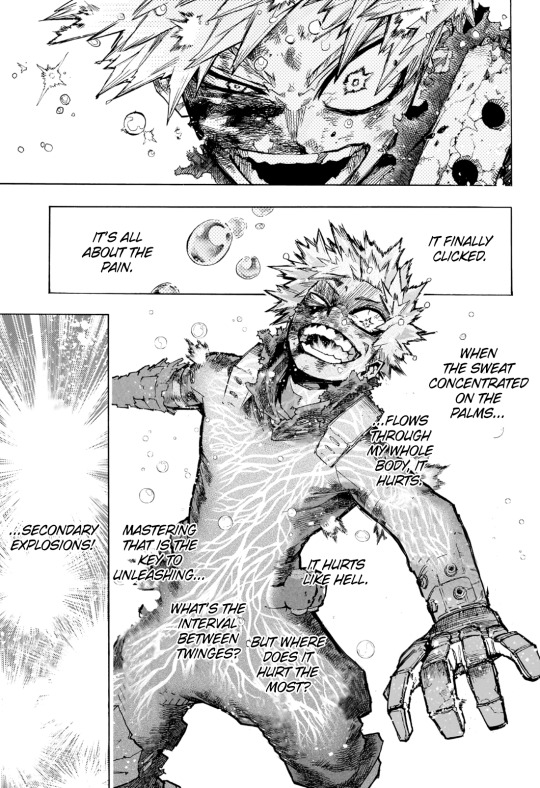
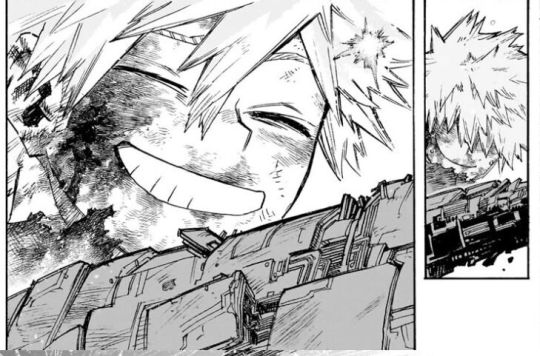
Katsuki and Izuku connect with all the various opposites attract concepts that draw on the Light/Dark duality (sun/moon, yang/yin) but the first mistake people make is approaching these concepts with black & white thinking in mind.
The meaning
The Light/Dark imagery/descriptions/metaphors with KT/DK exist as a set piece that subverts expectations by challenging binary/black & white interpretations.
Katsuki’s ‘light’ is confident and inspiring - but it can also be blinding, harsh, and overwhelming.
Izuku’s ‘darkness’ is almost like a blanket. It’s comforting and sympathetic - but it can also be scary, unnerving, and mysterious.
Initially, Katsuki wanted to get away from the ‘darkness’. Izuku was like his shadow, following him relentlessly. He misinterpreted Izuku’s behavior as secrecy or deceit.
Izuku dragged in as much ‘light’ as he could, by both observing Katsuki closely as well as refusing to part with the nickname ‘Kacchan’. His pursuit was a combination of hope for the future and a fascination for something he didn’t have (envy).
Both of them have a capacity for unending love and selflessness, but also uncontrolled rage and violence.
The point of this contrast is for us as readers to highlight and dismantle the surface level perceptions of these characters in the same way Katsuki and Izuku progressively do for each other.
Building on the themes
In the same way Izuku always saw, and admired, Katsuki’s “light”, Katsuki could see, and feared, Izuku’s “darkness”. This contributed in building tension between the two, both literally and narratively. Where another story may have framed them as opposing forces, however, MHA frames them as dual forces. Where the source of tension for opposing forces may be fundamental differences, the tension between Katsuki and Izuku comes from a REJECTION of their fundamental parts. By extension, this became a rejection of their potential for harmony.
There’s enough evidence to suggest the defining concepts for prototype/beta Katsuki and Izuku(Yamikumo) weren’t entirely discarded, but rather modified and layered upon. One of the major differences was how prototype KT/DK got along, with one of the earliest scenes drafted for MHA being a scene where they fight together.
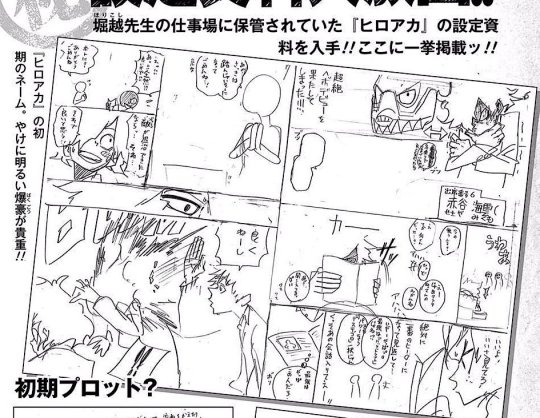
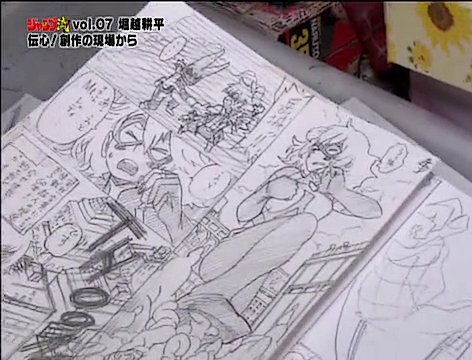
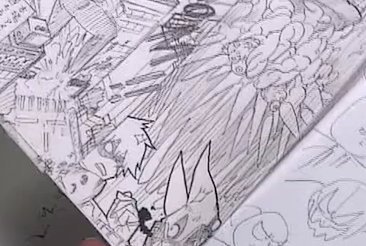
It’s ultimately a mistake to presume Izuku is purely a positive ray of sunshine just like it was a mistake to assume Katsuki was hiding a bitter and villainous darkness within him. It’s the neglect of their core that causes them to dig their heels in and become their worst selves:
Katsuki as egotistical, harsh and tightly guarded with a tendency to lash out, against Izuku as obsessive, obstinate and habitually repressing his emotions.
Society shaped their “quirks” (their power, outward appearance) but time and relationships informed their “individuality” (their ideals, hopes, inner drives).
Izuku's unwavering belief in Katsuki’s light was a tether that enabled Katsuki to embrace and flourish into it. Katsuki grew to understand the darkness in Izuku by confronting that which scared him. This allowed him to empathize with Izuku’s complex thoughts/feelings during a time where Izuku was at his worst (“Dark Hero” arc–onward) and dedicate himself to making sure Izuku didn’t carry the weight of the world and its burdens on his own.
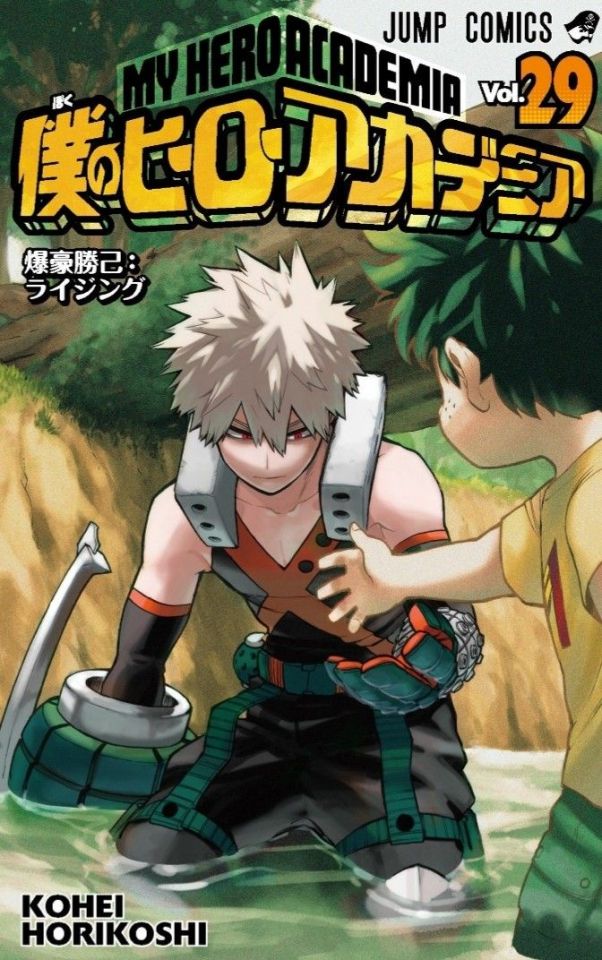
In other words, the inevitable payoff for KT/DK facing and dismantling the tension within themselves and between each other is the harmonizing of the dual/complementary themes they’ve been written to represent, which ultimately mirrors the main messages and questions posed by MHA.
‘The New Era’
As two major pillars of the story, Katsuki and Izuku are in many ways microcosm(s) of MHA society at large.
Katsuki and Izuku as complementary forces and not opposing ones seems obvious until it is put into practice. Some characters in the story and many readers in the audience alike have struggled with understanding their multifaceted nature and reconciling what they know of KT/DK from the outside with the seemingly contradictory information KT/DK have given us about themselves over time. Rather than a fluke, this contrast is an intentional writing choice evidenced by elements like their Light/Dark symbolism.
The lines at the main center of conflict in MHA - Heroes vs. Villains - has been long since blurred. In much the same way Heroes vs. Villains has complicated good vs. evil and challenges black&white thinking, KT/DK’s relationship as counterparts is representative of a greater duality that paints a clearer picture of MHA’s philosophies on the nature of heroism, societal progress, and the difficult process of inner growth. This picture is coming to a head with the story situating them as the beginning of “A New Era.”
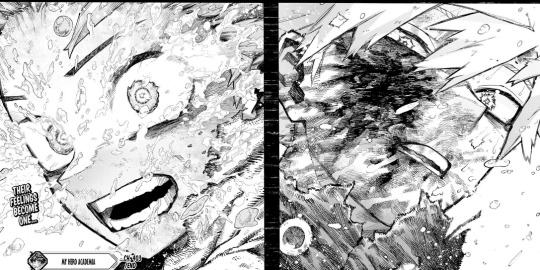
MHA understands people as collections of thoughts, feelings, experiences, abilities, ideals, hopes, drives, etc., and that contradictions and tension between them are inevitable.Through KT/DK, MHA has developed a beautiful narrative where strengthening oneself involves strengthening each other and broadening our understanding of who we are.
“There is a false saying: “How can someone who can’t save himself save others?” Supposing I have the key to your chains, why should your lock and my lock be the same?”
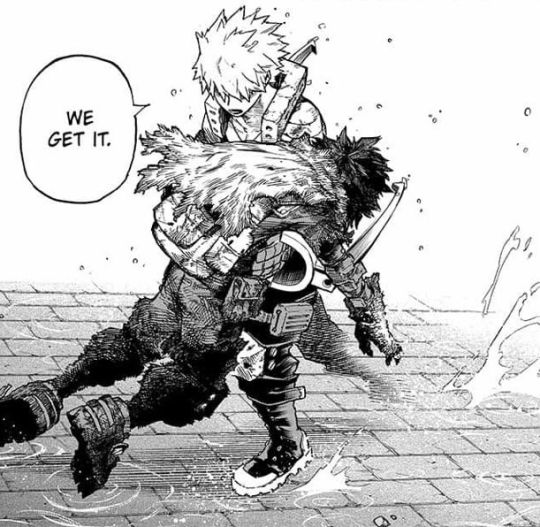
231 notes
·
View notes
Text
Judaism, Angels, and Monstrosity
@neapolitangirl asked:
I'm writing a story about the angel Muriel traveling through a world inspired by American folklore (Ex. The Bell Witch, Fearsome Critters, etc) while hunting demons. I wanted to draw inspiration from the legend that says Muriel and Abaddon are one and the same because I thought it was interesting. However, I also know that Abaddon is important to Jewish cosmology and wanted to avoid any unfortunate implications.
Muriel is very skittish and kind of a coward, but turns into the more violent and vengeful Abaddon in the presence of demons. Appearance-wise both Muriel and Abaddon are tall and skinny, but Muriel is more like an owly-human while Abaddon is a spiky skeletal being. Would this be connecting Judaism to monstrosity? Also, is there anything else I should try to avoid?
So…angelology, the whole idea of angels with names and personalities and individual jobs, is just…not something the average Jewish person thinks or cares about, even the ones who know a little about it. Not that it’s bad, it’s just not something that is prominent enough that it would have tropes attached that we might be able to warn you against.
That said, we’re posting on the Niche Scholarship and Special Interest website, so if there’s a reader who happens to have a lot of knowledge and feelings about Jewish angelology we would welcome the contribution and specialized expertise.
As it stands, my instinct is to give these more general considerations:
Balancing Jewish and Christian Elements
To what degree are you trying to tell a Jewish story, a Christian story that does not harm Jewish readers, or a story strongly influenced by Christian ideas about the heavens in a way that does not harm Jewish readers? How does deciding where you fall among those distinctions affect how you construct your story, and how you portray your angels?
Jewish Concept of God and Angelic Appearances
To Jews, God Godself does not have a physical body or visible appearance. If you’re describing the appearance of God as you’re navigating your angel-centering narrative, you’re squarely outside the territory of inclusivity toward Jewish readers. That’s okay, if you’re clear with readers that you’re not telling a Jewish story. It’s not okay if you’re trying to conflate Jewish and Christian ideas into a single narrative when they are often incompatible.
Angelic Appearances and Jewish Scripture
Angels might have appearances, and some descriptions of some types of angels in some Jewish scriptures have body parts of various animals. I haven’t the foggiest clue if it matters to anyone what appearances belong to which angels, so if it matters to someone reading this I hope they will speak up.
Are angels Jewish? This is a subject that could make for a fun discussion among Jewish people as a way of exploring the nature of Jewishness, but in your narrative you will have to think this through in your own way. If your angels engage in Jewish practices, then what does that look like and why, and if they don’t, why don’t they? The answer to that may of course be “Because I’m not actually telling a Jewish story.”
Christian Themes and Sensitivity to Jewish Culture
It’s okay to not be telling a Jewish story. But in that case keep in mind what demonstrations of Jewishness you include in a Christian story.
Especially, if you’re depicting a divine Jesus, or a Jesus character with any type of more-than-human powers or ancestry, or you are including any reference to the idea that Christianity might be in any way objectively correct, then you must tread EXTREMELY CAREFULLY with including any depiction of Jewish practice in your work, as the line where depiction turns to appropriation is in that case extremely near.
In all things, try and avoid depicting Jewish humans and any character who might be Jewish or be seen as Jewish in ways that are otherwise harmful: we’ve often talked about tropes around greed, sneakiness, power-grabbing, gender and sexual dynamics, and other tropes that apply to portrayals of Jewish characters. If your angels are Jewish, or Jew-ish in flavor, that goes for them as well.
Again, I know absolutely zero about Muriel and Abbadon and am not very interested in learning more as their lore has zero bearing on my Jewish practice in any way, and that’s a somewhat important point to me to be making because…2J3O. Two Jews, three opinions. So again, if a reader does in fact have knowledge and opinions about the specific angels themselves, please speak up.
–Meir
563 notes
·
View notes
Text
that one person in the replies of the black sails vs ofmd poll arguing against black sails being "an actual queer show" is being deliberately obtuse and a troll but i can't sleep so. sure. i'll say why dismissing black sails like that is intellectually dishonest
defining how black sails is a "queer show" or how queerness is written into its core is i think explained best by the other things that black sails is about. queerness is but one among the show's most important themes, that all overlap and intersect each other
on the societal level: hierarchies of power and influence - hinging on wealth, status, gender, reputation, et cetera. transatlantic empires - colonization, slavery.
on the personal level: identity, image - the performances we put on for others, safety, independence, dependence on other people. the narrative of a life. how human life resists narrative payoff. becoming, then bearing the burden of what you've become.
in general: stories - the power they and the act of telling both hold. the truth and its importance; its irrelevance. reasons. consequences. inevitability.
black sails is about all these things and it connects the threads between them with precision, narrative grace and emotional payoff. it is a tragedy about disenfranchised characters that are navigating their wants and needs in the face of various expectations, crafted with historical plausibility in mind.
if it's somehow still unclear how queerness ties into the show's themes... it is insulting and frankly absurd to denigrate the queerness of the show with arguments dismissing flint's struggle just because there wasn't on-screen sex between men. flint not being straight is only the backbone of the plot! and reducing wlw relationships that span the entirety of the show's four seasons into "male gaze fodder" or whatever is an incredibly disingenuous take that not only glosses over how multifaceted and integral their characters are but also reveals the bad faith nature of these arguments. the first season featured a lot of sex and violence, sure, to lure in a mainstream (GoT era) audience, but the mere existence of a wlw relationship alone? what about anne and max building their trust and love, balancing against duty and image caters to the straight man, exactly?
yeah, black sails does not really play for representation points - instead, it has real things to say: about fighting against a rigid society that would rather get rid of you. about choosing either idealism or pragmatism in the face of oppressive forces. about escaping your identity or holding onto it and the violence and freedom concealed in each choice.
174 notes
·
View notes
Text

I was rethinking the bookshop meta I wrote a while ago and realized I was not thinking big enough.
The bookshop has always been Aziraphale's version of Crowley's plants (his trauma reenactment), but also, absolutely everything Aziraphale does in Season 2 is a re-creation of Heaven's role. Crowley's behavior also encompasses everything, not just his plants.
I've seen it suggested that centering Aziraphale and Crowley's trauma histories is reducing their characters to behaving like just reactive victims instead of survivors with agency. Or worse, it's "excusing bad behavior." I don't agree with either of these, because I feel that part of Good Omens is about how large, powerful systems affect individuals, and so the context of every character's decisions matters a lot to the overall themes of the story. Everyone starts out working within a system they believe to reflect reality and then has to learn how to break free of it. You cannot really illustrate that without having the characters start out being genuinely trapped with different ways of coping with their reality.
This is an attempt at a pretty big-picture meta. Although it isn't a plot prediction, it's how I think some of the series' themes are going to progress. It starts out perhaps a little grim, but in the long run, it's how Aziraphale's character growth and relationship with Crowley can simultaneously be massive for them as individuals, a crucial part of the overarching narrative message of the series, and symbolic of a change in all of Heaven and Hell, all while allowing the themes to continue to prioritize human free will.
In short, it's about Aziraphale's problems, but it's also meant to be an Aziraphale love post.
All of the below exists in tandem with Good Omens as a comedy of errors. Just because there are heavy ideas does not mean they will not also be funny. Look back on how much of Season 2 seemed silly until we started to pick it apart! One of the amazing things about Good Omens is how it manages to do both silly and serious at once! (I feel like that's maybe a little Terry Pratchett DNA showing through. "Laughter can get through the keyhole while seriousness is still hammering on the door," as Terry himself said.)
Aziraphale has really embraced his connection to Crowley in Season 2, and he has also become considerably more assertive toward Heaven and Hell. These are both major growth points compared to the beginning of Season 1.
However, again, we have the concept of growing pains...Aziraphale is starting to re-create Heaven's role in his relationship with Crowley and humanity. It's really obvious with the Gabriel argument and the I Was Wrong Dance, but I think we see it all over the place: he seems to feel any serious dissent is a betrayal. He also seems to assume there's a dominance hierarchy and he, of course, is on top. Now that he's decided to take control of his own future, then surely that does mean he's the one in control, right?
With all that said, he still seems to have trouble being direct about the feelings that make him most vulnerable. He manipulates people and engineers situations in which he can try to get his emotional needs met rather than saying things outright (case in point: the Ball).
Like I pointed out in the bookshop meta: subconsciously, he's playing the role of God, modified with what God would be if She were everything he wants Her to be. He's generous, almost infinitely sweet, always does what's best for people...or, at least, what he believes is best for people. During the Ball, Aziraphale influences the people around him to be comfortable and happy even when they're not supposed to be, and he limits their ability to talk about things he thinks are too rude or improper for happy, formal occasions.
Doesn't this pattern sort of make sense for an angel who's just discovering free will? Like, at the end of Season 1, he made an enormous choice to stand against Heaven and realized he could survive it. Now he's gone a bit overboard with exerting his own will. Unfortunately, while he's learned to question upper management, he's still operating on a fundamental framework of the universe where there have to be two sides and there has to be a hierarchy. Also, since Aziraphale is on the Good side, he of course has to gear his desires into what's Good rather than just what he wants, so he sometimes thinks he's doing things for others when really he's doing things for himself. (For example, matchmaking Maggie and Nina started out as something he wanted to use to lie to Heaven, but by the time he was commenting "Maggie and Nina are counting on me," he seemed sincere, like he had genuinely convinced himself this was for them and not for himself.)
Aziraphale knows Heaven interferes in human affairs, ostensibly on God's behalf. He thinks She should be intervening in ways that are beneficial. What I believe the narrative wants him to learn is that God and Heaven shouldn't be manipulating people at all, not even for Good, and in fact there is no real meaningful hierarchy.
Anyway, a top-down, totally unquestioned hierarchy is the primary social relationship Aziraphale has known, and it's certainly been the dominant one for most of his existence: you're either the boss or the underling, and if someone seriously questions you, they don't have faith in you - they don't respect you.
No, his relationship with Crowley has not always been like that, but they've been creating their relationship from whole cloth, so how would he know it shouldn't become that way, now that it's "real" and out in the open?
No, human relationships aren't like that, but Aziraphale clearly does not see himself or Crowley as human. As the relationship approached something that seemed like it must be "legitimate," Aziraphale would naturally look for a framework to fit it to. And again, the only one he has is the shape of "intimacy," or what passes for it, in Heaven. What has "trust" always meant in all his "legitimate" relationships? It has always meant unquestioning obedience, of course. What have the warm fuzzies felt like in Heaven? Well, praise from the angels above him is nice, so that must be it, right?
Aziraphale even describes being in love as "what humans do," separating out that relationship style. Someday, I think he'll realize he favors the shape of love on Earth, something that's more inherently equal, more give-and-take. Look at how he idealizes it from afar at the Ball. But I think that, like Crowley before Nina pointed it out, Aziraphale maybe hasn't 100% grokked that it can and in fact should work that way for him and Crowley, too. Just like people can desperately want to dance without knowing how to dance, or can desperately want to speak a language without knowing the language, Aziraphale does not instinctively know how to have the kind of relationship where he can be truly vulnerable and handle Crowley's vulnerability as well.
Aziraphale is downright obsessed with French, known as the "language of love." He's trying to learn it the Earthly way. He's not very good at it, but he wants to be.
This pattern is still present during the Final Fifteen even if we assume Aziraphale is asking Crowley to become an angel again out of fear (and I find it very hard to believe that fear doesn't factor in at all). He's still building his interactions off of that Heaven-like framework: he asks Crowley to trust him blindly, he tries to assume a leadership role with a plan Crowley never agreed to and couldn't follow anyway, and he tries very hard not to leave room for an ounce of doubt. He also suggests making Crowley his second-in-command and obviously does not register that this could possibly be offensive. Again, I think this is because for Aziraphale, there has always been a hierarchy in Heaven, it's started to transfer to his relationship with Crowley, and breaking out of that assumption about relationships is going to take more processing than a single argument can do.
As I mentioned in another post, I don't believe Aziraphale had a real choice about whether he accepted the Supreme Archangel position. I think he could sense that he was not getting out of it and chose to look on the bright side, to see it as an opportunity. And instead of looking realistically at how that would feel to Crowley, he tried to sweep Crowley up to Heaven with him using toxic positivity, appeals to morality, and appeals to their relationship itself. Again, mimicking what Heaven has done to him.
To me, "they're not talking" is a big clue that Aziraphale's approach with Crowley is going to be the mistake the narrative really wants him to face. "Not talking" has, thus far, been presented as the central conflict of Season 3! After losing the structure and feedback Heaven gave him, Aziraphale started creating Heaven-like patterns in his relationship with Crowley, and breaking out of those patterns is what he needs to do. Discovering first-hand that Heaven's entire modus operandi is bad no matter who's in charge is how he can do it.
Look, either you're sympathetic to Aziraphale's control issues or you're not. Personally, I am. He's trying so, so hard to be good. I think trying to figure yourself out (which Aziraphale is clearly doing) is hard enough, and when you start balancing what you want for yourself, what you think are your responsibilities, and what other people are actively asking of you, you're bound to fall into the patterns that have been enforced for your whole life or for millions of years, whichever came first.
It is very easy to assume that people should Just Be Better, but it's not actually that simple to be a thinking, feeling person. My anxiety tends to move in a very inward direction and Aziraphale's moves outward. But I'd imagine the desperation and exhaustion are the same.
Unlike Nina, Aziraphale became a rebound mess. I don't think it occurred to either him or to Crowley that there could be any soul-searching, anything but carrying on with the new normal after their stalemate with Heaven and Hell.
Now, instead of getting rejected by Heaven and surviving it, Aziraphale needs to be the one to reject Heaven. It needs to be a choice. And that choice is going to come from realizing that Heaven isn't just poorly managed but also represents a bad framework for all relationships.
How could this happen? Good question. We're obviously not supposed to know yet, although I think picking at existing themes within the narrative could possibly give us hints.
It's possible Aziraphale's character development trajectory will be akin to Adam Young's in Season 1. Please see this stellar post by eidetictelekinetic for more thoughts about it, but basically, in Season 1, Adam saw that the world was not what he wanted it to be and decided his vision was better; as he ascended to power, he took complete control over all his friends and then soon realized that's not what he wants because there's no point in trying to have relationships with people who can't choose you. It's that realization that leads Adam to conclude he doesn't want to take over the world and to reject the role he's expected to play as the Antichrist. Maybe Aziraphale's trip to Heaven is an attempt at a control move during which he'll realize he's defeating his own point.
Aziraphale clearly wants to be chosen. From the very beginning, he's wanted to be special and cared for - just like Crowley has.
Incidentally, I think Aziraphale and Crowley are going to represent pieces of the bigger picture here, and this - first imitating and then rejecting Heaven's relationship style - can both symbolize Heaven's transformation and directly start it (probably in an amusing, somewhat indirect way, like when he handed off the flaming sword to Adam).
If I'm right - which I may very well not be - I think this would all be so, SO cool. Like, "An angel who is subconsciously trying to be a better God" is a concept with so much potential for both tender kindness and incredible darkness. Add to that the comedy-of-errors aspect of "...but even deeper down, he'd much rather just be super gay on Earth" and you have, in my opinion, a perfect character.
I think this could work for Crowley as well. It's obvious that in the Good Omens universe, at least so far, Hell is all about detesting humans and punishing them; Satan seems to genuinely hate humans (unlike in some of NG's other works). Our perspective on this could change, but it potentially puts Crowley in a complementary position to Aziraphale, as a demon who is trying to be "better" than Satan. But this isn't about being "morally better." It's about things having a point. Crowley's exploits usually have a point: they test people. And you can pass his tests! He sincerely likes making trouble, but Crowley doesn't live to punish.
But, once again, the above paragraph would describe a transient phase for this infinitely charming character. Because, again, I think the point will be that in the end, Crowley's deeper-down desire, moreso than testing Creation, is watching it grow with a glass of wine in hand.
172 notes
·
View notes
Note
I don't know if you have read about Filoni saying that anybody/everybody can use the force now, that it was GL's vision on the force which is clearly a misinterpretation imo, to me he's just trying to make excuses for his bad writting about Sabine in the Ahsoka series. I do like the idea of everyone being part of the living force but I hardly dislike to think that anyone can be force sensitive and "become a Jedi" like they are trying to imply now. I mean, being a Jedi is more than being sensitive i know but I hope i make sense in what i'm trying to say here. I do like Sabine in Rebels she is such a good character as she is, a badass Mandalorian, why everyone needs suddenly use the force and be a Jedi out of nowhere? I'd like to know your opinion about it if you feel like answering. Thanks.
I mean, I will give Felony this: I'm pretty sure Lucas did say somewhere along the way that the Force is for everyone/that everyone can use the Force.
My issue with Felony isn't that Sabine can use the Force, it's that his writing to take her down that path felt disconnected from her entire established story and that he stretched the worldbuilding too far--being able to grab your lightsaber in battle, okay, sure, maybe I could accept that, but the ability to also give Ezra a massive push across that huge of a distance.
The Jedi have always said the Force is for everyone, Yoda gives a whole speech to Jek, Thyre, and and Rhys about how they can use the Force to quiet their minds in the very first episode of TCW. I don't have Lucas' quote on hand, so take it or leave it as you will, but I do think "the Force is for everyone" fits with his themes.
I just don't think that Sabine being written as a Jedi makes sense for her character, even given how lost and adrift she felt (not that we actually got to see any of the important part of why she would turn down this path, just suddenly she's here! and only monologuing to tell us what happened), beyond Felony wanted her to be special. And I'm all for female characters getting to be special (male characters get to be special all the time) but not at the expense of breaking the worldbuilding, because now being able to wield the Force means less, because it's being handed out like candy to Felony's faves, rather than something that has worldbuilding and thematic rules.
But that's also coming from someone who cares more about the Force and the themes of the narrative than almost any single character in Star Wars, so I treat it as being rather precious, and other people aren't going to feel the same way. A lot of people probably did love Sabine getting to use the Force.
If Sabine had genuinely only been able to do small things or used it to quiet her mind/feel connected to the galaxy, I would have been perfectly fine with that. That made sense to me. But that giant push for Ezra to get him on the ship? Blehhhhh, that was more about making a Dramatic Moment than it was about keeping to the themes of Star Wars. So, personally, I'm just kind of compartmentalizing it into "Felony's pet fave gets special treatment, I'm not counting it towards worldbuilding" because I just don't care enough anymore. XD
158 notes
·
View notes
Note
I was watching the Clone Wars featurette about the Holocron arc and Dave talks about the scene where Bane threatens to kill Ahsoka. He says "we're seeing a dark side of Anakin, and in a very clear illustration of why Jedi should not have attachments, we see that attachment get exploited." So clearly at what point in time he understood the whole attachment thing. What happened?
Unlike Karen Traviss, I think Dave Filoni actually understands what "attachment" means, in Star Wars. Apparently, it's the Star Wars theme that he and George spoke the most about.
"The biggest area of the Force and the Jedi [that] George and I have gotten into discussing the whole deal with attachments. And, arguably, that's what Anakin whole life is hinged on, is this - like you've mentioned - he has a lot of attachments to Artoo and how how right or wrong is that? Is it that the Jedi have made themselves dispassionate, that they are actually deceived by the Sith and they fall apart?"
- Dave Filoni, Rebel Force Radio, 2012
What I've noticed is that, while understanding the meaning of attachment... Filoni doesn't seem to agree that the Jedi embody the concept of compassion.
He has acknowledged sometimes that "attachment is bad" is the theme of Anakin's story (but question if it's really so bad, unlike Lucas who says it's understandable but bad) but disagrees that the Prequel Jedi represent the obvious counter-theme, "compassion is good."
If you read what Filoni says, he argues that:
The Jedi have lost their way, taken the "rid yourself of attachment" rule and pushed it to an extreme where they've rid themselves of any empathy and thus compassion. They've focused so much on being selfless that they've forgotten how to love.
All except for Qui-Gon, who is the only one that truly knows how to love without getting attached, to love selflessly.
And personally, that strikes me as a coping headcanon, a way of reconciling the theme and feeling the Jedi like Mace, Ki-Adi, even Yoda and Obi-Wan are stoic, unlikable and too different from Luke.
Sure, they're not perfect, but nowhere in the films is the Jedi's stance on love framed as "bad" by the narrative. The narrative agrees with their philosophy, and George echoes it.
In fact, among 772 collected George Lucas quotes, I've never seen him state that theme while adding the asterisk that "of course, the Jedi of the Prequels have forgotten how to be compassionate, except for Qui-Gon who was the true Jedi."
And of course he doesn't do that. Because doesn't that muddy the waters so much?
Supposing Qui-Gon truly is the only character that embodies the concept of "compassion"... doesn't killing him off in the first film confuse a targeted audience of children?
Bearing in mind that the Prequels are about how greed makes people and institutions become the very thing they swear to destroy, and Star Wars as a whole is about being selfless instead of selfish:
In one corner, we have Anakin and the Senate showing what you're not supposed to do.
In the other, you got Padmé, Shmi and the Jedi, showing you what you should do instead.
Simple. I can see a kid getting this (and I did). But according to Filoni, that second point is incorrect. Instead, it's:
In the other, we have... Qui-Gon, who is one of the first film's four protagonists that dies at the end, without openly stating anything about the trilogy's theme. Theoretically, there's the Jedi who state and address the theme, but they don't themselves embody it so they don't count. So really... in this corner we have nobody (?)
That seems overly complex, a whole lotta hoops to jump through. Doesn't make sense. But hey, good luck learning the lesson, kids.
So yeah, Dave Filoni gets what attachment means. He just doesn't think it's as bad as Lucas' films frame it as, and disagrees on the Jedi narratively embodying the concept of compassion.
And I think it's coping. It's connecting non-existent dots, Always Sunny-style, to justify not liking characters that weren't meant to be developed much, due to their calm, collected nature and secondary/tertiary role in the story.
Coping and coming up with headcanons are what any irritated Star Wars fan does when they're confronted with something they're unable to make sense of.
“I care because I passionately believe that important stories ought to make sense.” As well you should—and when a story does not, you apply that passion to finding a way to make it make sense. [...]
When a rational and inquisitive mind is confronted by the engaging yet irrational, it often responds in this manner. This process is not usually appreciated by those undergoing it; the most common reaction is a deep irritation. But isn’t that always how pearls are formed?”
- Don DeBrandt, Star Wars on Trial, 2006
Unless they choose to make documentaries and click-baity YouTube video where they decide to spew hate and get angry pointlessly. Which I'd argue is still worse.
132 notes
·
View notes
Text
I do think the "Dick overwhelmed with grief and guilt upon Jason's death and swearing to 'do better' with future Robins and his character is fundamentally changed as a result" theme can still hold water tbh.
bc even if Jason's take is 100% "yeah Dick was fine. He was just an older brother who lived in another city, I saw him sometimes, he told me jokes and bought me ice cream, no notes" it is entirely in character for Dick to retroactively blame himself!
For him to temper and sharpen his grief by saying, "I treated him like a kid brother when in reality he was a child in constant danger and I was an adult and his safety was my responsibility. If I'd taught him this, connected with him more on that, been someone he could have reached out to, maybe he wouldn't have died" and wallow and fester completely independently of any feelings Jason actually had on the matter.
The best thing about Jason's death is the potential for it to narratively destroy everyone in a thousand wildly different and in-character ways imo.
Not everyone has to be a bad guy but everyone does have to be a sad guy ya know what I mean?
#Jason Todd#dick grayson#red hood#nightwing#dc comics#batman#robin#like a major character DIED. close to permanently. if the characters weren't affected and changed it's bad writing#greatest hits
3K notes
·
View notes
Text
Bringing back Maul was just as bad for what Maul's character originally represented and the negative impact it had on Obi-Wan's characterization as bringing back Palpatine was for what Palpatine represented and the resolution his death brought to Anakin's story.
Maul is the beginning of the end, he is CURRENTLY defeatable, but he can still kill a Jedi, he still kills Qui-Gon because he represents what the darkness can become and what we all know that it WILL ultimately become. He is a harbinger of death. Bringing him back takes away ALL OF THAT. He's no longer connected to Palpatine as the first indication of that oncoming darkness and Palpatine's reach, he's just... flitting around sort-of randomly with no actual purpose or meaning to the narrative around him.
And Maul represents the darkness that Obi-Wan PERSONALLY overcomes. That fear of loss, the fear of moving beyond his teacher, of being forced to grow up early and take on a responsibility you aren't sure you're ready to bear, the anger at the unfairness of it all. Obi-Wan faces it all and overcomes it. It's redundant to show that struggle to us again. And again. And again. And again. Unless the character has something that causes him to completely fail and fall to darkness, I don't need to see him overcome it twice within the same narrative. I already know this about the character. Yes, realistically, people have to keep overcoming the flaw and sometimes they struggle with it more than others, but this is a narrative, it's a fable, I only NEED to be told this character trait once to understand that it's still true.
It also removes a lot of the earned confidence Obi-Wan has later on. Obi-Wan is a Sith Killer, the ONLY Sith Killer in the Order for 13 years and the first in 1000 years. When Obi-Wan faces Dooku with a certain level of confidence, we're supposed to remember that Obi-Wan has earned that confidence in himself. When he goes up against Anakin in the finale, we're supposed to remember that he's killed a Sith before. We're supposed to remember that he's ALREADY OVERCOME HIS OWN FEAR OF LOSS, he already learned that lesson, and that is what will grant him a victory against Anakin in this moment. Instead, Obi-Wan ends up looking like a joke because that Sith he thought he killed just keeps coming back like a bad penny. Why should anyone in-universe or out of it believe Obi-Wan has even a chance against Anakin or Dooku when we know that the Sith he thought he killed is still alive out there?
Bringing back Palpatine is pretty uniformly recognized as a stupid, lazy decision on the part of the filmmakers for the sequel trilogy. No one wanted him back and it truly adds nothing to the story for him to still be alive. What it DOES do is fuck up the entire resolution of Anakin's storyline. Palpatine represents Anakin's demons, his temptations, his weakness and selfishness. When he kills Palpatine, he's not just killing a villain, he's literally supposed to be overcoming that selfishness, rejecting the temptation to do the easy thing, just for a moment. Bringing Palpatine back means that those demons weren't really vanquished, the entire point of overcoming them visually is now gone. The symbolism is lost by saying he wasn't actually dead and he's still around. Palpatine can't just stop representing those things in order to be in the sequel trilogy, that's not how it works.
And it's the same for Maul. Neither character should've been revived because what their deaths represent for the characters who kill them is too important to the narrative's themes to undo out of pure laziness.
#star wars#obi-wan kenobi#anakin skywalker#sheev palpatine#darth maul#sorry maul girlies#idgaf if you think he's hot or tragic or both#the man should've stayed dead#maul critical#darth maul critical#sequel trilogy#star wars sequel trilogy#sequels critical#sequel trilogy critical#star wars sequel trilogy critical
223 notes
·
View notes
Text
Ashlesha: The Villain Era Nakshatra
Ashlesha nakshatra can create poison to destroy their enemies. They also have the ability to restrain their destructive powers and hold poison within themselves. As I said in my previous post, Ashlesha embodies the demonic feminine and showcases qualities of the dark side of the feminine. But we need to understand that "darkness" is a spectrum and can be defined/portrayed in a variety of ways.
In this post I'll explore various tropes that Ashlesha natives portray on screen.
Peyton List, Ashlesha Sun plays Poison Ivy in Gotham
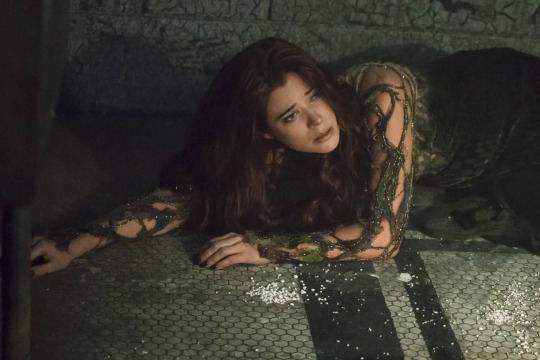
"The thing I love most about Poison Ivy is her walking that line between bastion of Mother Nature and psycho Eco-terrorist. She sees herself as the hand of Mother Nature. If Mother Nature were "God," then Ivy would be her "Jesus." She defends the defenceless nature of the world and truly believes in her cause. Maiming, mauling, and mutilating are extreme measures, but it's nothing compared to what irredeemable cruelties humanity's done to the world of nature. Ivy always sees the greater good as she punishes those who deserve it."— J. T. Krul (comic book writer)
This describes Ashlesha natives quite well. They truly believe that the people they hurt deserve it. The aspect of serving karma/justice is a very prominent one.
Poison Ivy has the following abilities:
Genius-level intellect
Manipulation of plants and toxins
Decelerated aging
Expert seductress
These can all directly be connected to Ashlesha. Being a Mercury ruled nak, these natives are naturally intelligent and their minds work very fast, given the mythology of this nak, their connection to toxins and poisons is a gift given to the Ashlesha native. Mercurial women often look very young/youthful and maintain this youthfulness well into their 30s and 40s and on. This nak's deity is Nagas, the serpent God and serpent connection in any nak is a strong indicator of potent sexuality and seductive energy.
Poison Ivy possesses a poisonous touch and is characterized as a "supervillain" or "antiheroine".
I had mentioned in my old post about how movies featuring Ashlesha women have a common trope of them being abused, gaining power through that violent experience and then using those powers to go after all the bad guys.
Similarly, Poison Ivy was a botanist who was persuaded by Marc LeGrand to assist him with the theft of an Egyptian artefact containing ancient herbs. Fearing she would implicate him in the theft, he attempts to poison her with the herbs, which are deadly and untraceable. She survives this murder attempt and discovers she has acquired an immunity to all natural toxins and diseases.
2. Jennifer Lawrence, Ashlesha Sun plays Katniss Everdeen in The Hunger Games
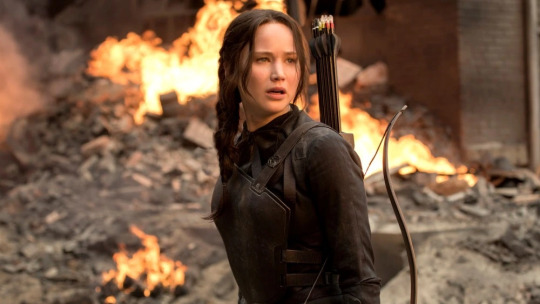
if you're familiar with the books or the movies you would know that there is a heavy emphasis on Katniss' resorting to manipulation to skew things in her favour, both on and off the arena.
She's competing in a survival reality show where tributes have to kill each other for the entertainment of the masses but she manages to turn things around in her favour through media manipulation, using everything to her advantage.
This emphasizes on Ashlesha's mercurial ability to play with perception and skew the narrative in their favour.
Katniss is an impoverished girl from the poorest district with no chances of winning but she relies on things other than brute strength to see her through the Games.
3. Barbra Streisand, Ashlesha Moon as Yentl in Yentl
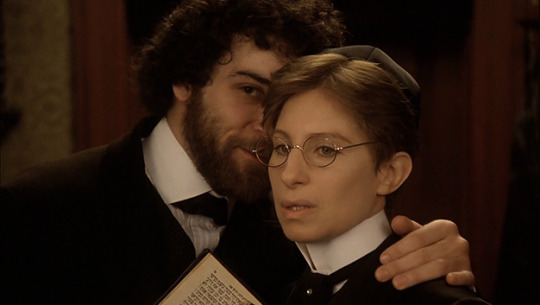
This movie is about a girl who disguises herself as a guy to go to school. She falls in love with her male classmate and his gf falls in love with her (believing her to be a guy).
Claire had said in her Ashlesha video about how WLW themes in cinema often involve Cat yoni gals (Punarvasu or Ashlesha)
4. Catherine Deneuve, Ashlesha Moon in The Hunger (1983)
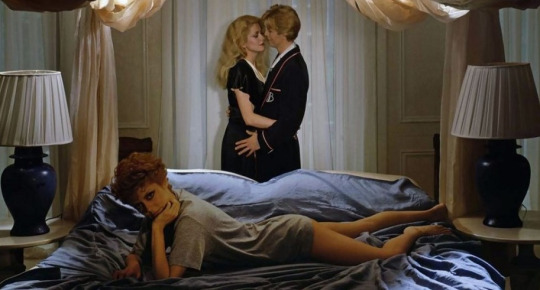
this is yet another very Ashlesha coded movie about a vampire (played by Deneuve) and her aging partner and the doctor he consults to help with his condition and the homoerotic bond that develops between these women.
the fact that Deneuve is playing a vampire (i've noticed Ashlesha playing demonic/monstress esque characters a lot) and that "aging" is a main plot point (vampires don't age) is vv intriguing since mercurials are the most "young/youthful looking"; Mercurials are essentially teenagers even as they grow older, they don't "age" the way most people do, not just physically but also mentally and of course, it wouldn't be an Ashlesha coded film without some WLWism in it.
A major reason why Cat yoni girls are drawn to other girls or to non-penetrative intercourse is because sex is vv painful for female cats. A male cat's penis is barbed, and these little spikes scrape along the female cat's vagina during copulation, making sexual intercourse vv painful for them. I have noticed that many Cat yoni women irl tend to have vaginismus or other conditions that make penetrative intercourse unpleasant or difficult for them. Making love to another woman or intercourse with a partner (male or female) that's largely centred around foreplay is what feels pleasurable to these natives. More than the act of PIV, its intimacy that they crave from sex. They can be very passive in bed and find it hard to orgasm with just PIV. A low libido is also likely. They're not prudish, they're very imaginative with what they desire but when it comes to actually physically expressing themselves, they're like cats, they can't express it.
5. Audrey Tautou, Ashlesha Sun in Priceless (2006)
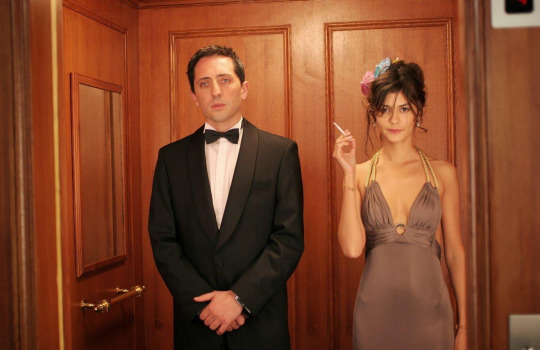
Audrey Tautou plays a gold digger-y woman (a common Ashlesha trope) who mistakes a bartender to be a wealthy man. She later helps him work as a gigolo for a wealthy woman.
Ashleshas are skilled at manipulation (this is often described in a negative light by many astrologers but manipulation is a skill like any other and can be used for good and bad reasons). This whole movie revolves around one woman's ability to manipulate men into giving her what she wants and by teaching this to another person, she is emphasizing the fact that this is a skill that can be picked up (an essential Mercurial principle because Mercury is about that which we cultivate not what we've been innately gifted with).
6. Marilyn Monroe, Ashlesha Rising in Gentlemen Prefer Blondes
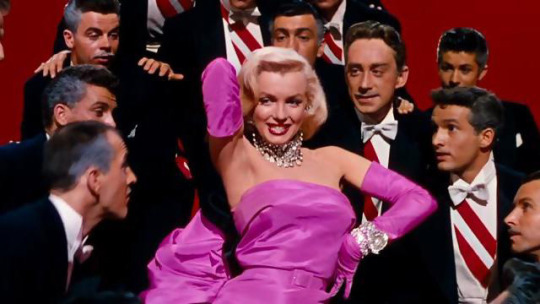
MM plays a gold digger who carefully uses her feminine charms and allure to get with wealthy men. Understanding how to channel femininity in ways that benefit them is a very Cancerian woman thing.
If we were to consider the fact that Marilyn basically created a whole alter ego, adopted certain mannerisms, dressed a specific way, used a fake baby voice, styled and kept up a whole persona then we can see the positive manifestation of Ashlesha and Cancer's manipulative feminine nature. She wasn't born Marilyn, she became her through her carefully cultivated charm. This is peak Mercury, peak Cancer behaviour.
Sidenote: I've noticed many Cancer women speaking in a fake baby voice tbh hehe, Paris Hilton (Pushya Moon) also does this. Paris is also a great example of Cancerian performative femininity. She managed to convince the whole world she was a dumb blonde heiress when she was anything but. She created a persona for herself and played that character to the t. Her hyperfeminine mannerisms, almost caricatur-ish personality has had a lasting impact on pop culture. She herself has come out to say that she "was playing a character".
7. Anna Kendrick, Ashlesha Sun in Alice, Darling (2022)

this movie is about a manipulative, abusive and controlling relationship based on anna kendrick's real life experiences. Ashlesha women and Cancer women in general are very susceptible to relationships of this sort. It starts at home usually, these women have very dysfunctional relationships with their mothers and go on to form unhealthy and toxic romantic relationships (if unevolved).
8. Ashlesha's connection to Snow White
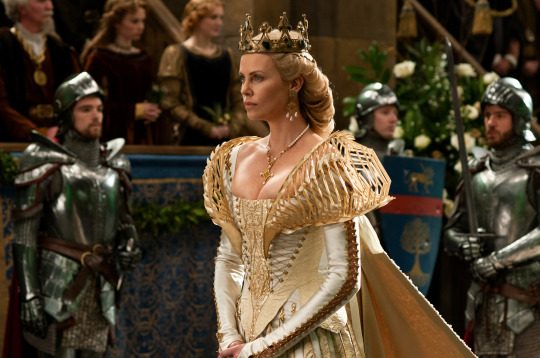
Ashlesha Sun & Moon, Charlize Theron as the evil stepmother in Snow White & the Huntsmen

Ashlesha Moon Lily Collins as Snow White in Mirror Mirror
Snow White's story depicts the OG toxic mother-daughter dynamic which is a common theme in the lives of many Ashlesha natives. Receiving step daughterly treatment from your own mother and having a sibling who is more favoured than you is another common theme.
We see this play out in real life with Bella and Gigi Hadid who both have Ashlesha Mars as their atmakaraka and amatyakaraka respectively.
Many Ashlesha women play the toxic mother in tv shows and movies (Vera Farmiga, Ashlesha Moon in Bates Motel) but its equally likely for them to play the daughter who is at the receiving end of the abuse.
A major way that this "toxicity" manifests is through highly co-dependent relationships with their mothers, who essentially run their lives for them and keep them "trapped" in childlike passivity. The thing is Ashlesha women almost kinda like it this way, they want to be taken care of, they're needy and would much rather have someone else do everything for them. Rising above this passivity is their biggest challenge.
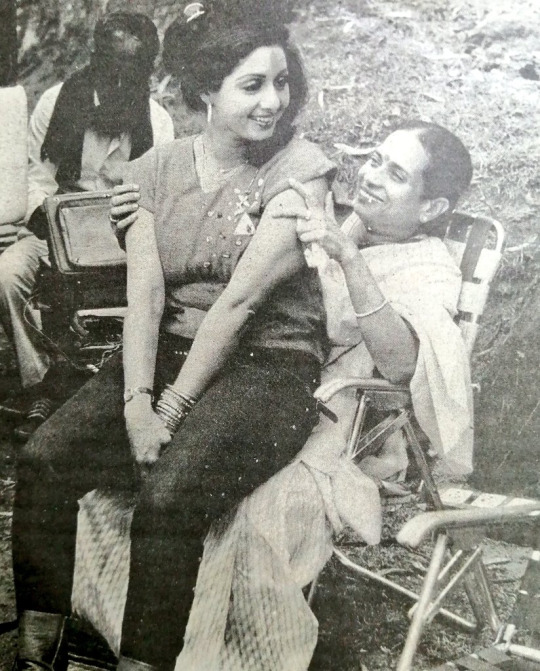
The Indian actress Sridevi (Ashlesha Sun & Stellium) was known for her highly co-dependent relationship with her mother. In the 80s during her peak, it was a running joke that you could ask Sridevi anything and she'd respond with "Ask Mummy". Sridevi, like many Ashlesha natives had a very childlike personality and was often described as lacking "mental maturity". The reality is that her mother micromanaged her life and made all her decisions, controlled her finances and told her what she could do and couldn't do until she passed away when Sri was well into her 30s. She forced Sri into films when she was barely a toddler and never gave her any formal education. Of course Sridevi never described this relationship as "toxic". Most of these natives wouldn't because its been ingrained into them that they're incapable of getting anything done on their own and "need" their mother to do things for them. They're gaslit into believing they're inept. (Sridevi was also known for speaking in a baby voice 😌)
Ashlesha lies entirely in Cancer rashi which means they are lost to the watery depths of Cancer's influence, the combination of Moon & Mercury always makes one prone to manipulation and although this is considered a negative, I absolutely believe it can be manifest in positive ways. However it IS hard.
The feminine/ yin urge to absorb energy manifests itself in an absolutely self-serving here. Imo this is by nature self serving always however other Cancer rashi naks have the ability to give to others in ways an Ashlesha native can't.
Ashlesha is cancer at its most passive, absolutely unable to "give"; this means they feel easily drained by others and have to be very selective with who they give their energy to. Women in society are harshly judged for how much of their energy they give to others which is why Ashlesha women who are largely self contained are viewed as "toxic", because our society looks down upon women who only exist for themselves, we're all taught to "give". A woman who cannot do so is seen as "toxic" because its "selfish" to keep to yourself. This is why Ashleshas are so grossly misunderstood.
Mercurial women have a very complicated relationship with sex and sexuality. This is most evident in the case of Ashlesha women. Cat yoni is the most restrictive yoni and this is not only apparent in their sexual preferences and relationships but in the way they conduct themselves generally. They are usually introverted and struggle the most with their tendency to be passive because cats are by nature, very lethargic creatures who are self involved and seldom seek outside company.
The other two mercury naks, Jyeshta (rabbit yoni) and Revati (elephant yoni) have a very different approach to sexual matters. For Jyeshta natives, its the frequency of sex that matters, since rat/rabbit yoni is considered the most sexual. They usually have a high sex drive but sex itself is impersonal for them.
However for Revati natives, given that their yoni is the largest land animal, more than frequency its the quality of sexual intimacy that satiates them. They are thrill seekers. Sex that is ordinary or "vanilla" does not fulfil them; there has to be an element of adrenaline rush, which BDSM or other taboo relationships can provide but its rare for these natives to feel pure, naked desire for someone, they crave the thrill of sex itself.
Overall, a major focus in the lives of Ashlesha natives is building an identity for themselves. Many of them cultivate a self that's entirely different to who they were growing up, with a very apparent change in style/mannerisms etc. Like snakes (to whom they are closely linked) they need to shed their skin and renew themselves again and again.
Their Mercurial gifts of intellect, wit and street smarts see them through these and allow them to flourish in every avatar.
#sidereal astrology#astrology notes#astrology observations#vedic astro notes#astrology#vedic astrology#astro notes#astro observations#nakshatras#astroblr#ashlesha
304 notes
·
View notes
Text
Skein of Destiny
Now that I've got your attention with a shitpost I do want to plug the article I worked on that prompted it, and throw out some thoughts that are too speculative for wiki articles!
What we know (ie, the canon stuff; much of this is also in the article with citations)
The skein is a physical manifestation of the concept of fate, with threads representing the fate of individuals - Vax and Caleb have both seen it in two entirely different contexts, and Evontra'vir's roots grow into it.
The idea of destiny and fate as a skein/tapestry/weave is nigh-universal in Exandria. It is consistent among worshipers of the Prime Deities (Raven Queen and Ioun both reference it; The Raven Queen's domain includes fate), the Luxon (Caleb sees the skein within the beacon), and nature (Evontra'vir was a druid of the Gau Drashari). Nana Morri, a hag in the feywild, acknowledges it is the Raven Queen's domain, though she has the ability to see it and influence threads beyond her own from an external perspective; Teven Klask (worshiper of a Betrayer God) identifies Fearne as being "outside the knotted weave." Arcane, divine of pretty much all known forms, fey, fiend, and elemental are all united in this understanding in a way they are not really about anything else.
Destiny and fate as understood in Exandria do not mean "all is pre-determined" (as indicated in the shitpost, this is about the interplay of fate and free will, which have always coexisted). The above entities are also united in this understanding. The Raven Queen notes that Vax, as Fate-Touched, influences the fates of those around him in unique ways not merely limited to his choices, but does grant him many choices herself, and tells Percy when he asks her for answers that "There are a great many deeds ahead of you. It's your choice to take them." Ioun says something similar to Vox Machina, and a core tenet of the Changebringer is "Luck favors the bold. Your fate is your own to grasp." The Luxon and Dunamancy are based on the concept of possibility, of many potential paths taken and not taken, and not only do chronurgy wizard spells and the fate-touched ability share certain mechanics, but also permit a do-over, since the future is not yet known. When Caleb observes the threads he sees multiple branches off of them that are implied to be based on possibility (ie, there is not merely one option). And Evontra'vir in episode 3x74 directly tells Bells Hells that while some things are fated to happen, it will be their choice that determines what happens to the gods; it also tells Ashton they are fated to retrieve the spark, but also to bestow it, a choice that is their own.
All three of the main powers discussed (Raven Queen, Luxon, Evontra'vir) also serve to preserve the cycle of life, death, or rebirth in some capacity.
Some thoughts: Honestly the big one is that while the idea of fate vs. free will or of the future being a series of possibilities rather than one definite path is a very common one in epic fantasy (frankly, the idea of Fate as "everything is predetermined" is a bad one anyway in fiction because then there's no point in telling the story), there is a particular ludonarrative harmony to play with this theme in a TTRPG. There is a general path laid out before you, but it is not ironclad, and you can make choices to attempt to change this. Sometimes you will fail despite your best efforts based on factors beyond your control but sometimes you will experience unlikely success. The narrative is shaped by this interplay of possibility/probability and choice.
Some wild speculation: I think a peaceful parting with the gods (ie, stopping Predathos and then Bells Hells making their choices about the fate of Exandria as stated by Evontra'vir) would still preserve this skein fate (as would of course maintaining the divine status quo), but a failure to stop Predathos will destroy it, and the fabric of the cosmos (the roots of Predathos are between worlds; fate connects all of the inner planes). I desperately need to know why Fearne is said to exist outside of fate, because I don't know if that's a fey thing, a Ruidusborn thing, a Nana Morri thing, or something else entirely. I would be shocked if the Luxon doesn't come up in SOME capacity later in the campaign (or perhaps in the Echoes of the Solstice one-shot coming up), and I'm very interested in seeing what other party members might gain as they gather their allies and resources. And I don't think it's coincidence that the two deities devoured by Predathos pre-Schism included Vordo the Fateshaper (nor Ethedok, the Endless Shadow, whose domain of darkness and winter is thematically associated with the cycle of life and death).
#the hilarity of me going full string conspiracy board about a skein has not been lost. join me will you?#critical role#i have still more thoughts about the party makeup and how they fit into this but i wanted to quit while ahead#critical role spoilers#long post
131 notes
·
View notes
Text
MeMe and Control over One's Own Destiny
Alright I've been holding off on talking about Mikoto until Double releases, but I saw he was on a train and my brain went Silly. Don't you understand how crazy the symbolism is?! (<- Mentally unwell)
So now I have to talk about how MeMe handles the concept of destiny and the control the alters have on the system's future, because it's honestly so interesting to me.
CW Murder
Disclaimer: I'm not an expert on DID, feel free to correct me if I get anything wrong
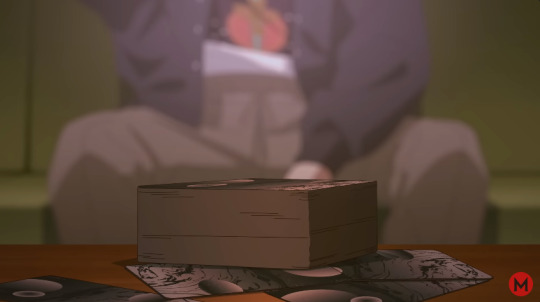

The first big connection between MeMe and the idea of destiny is obviously the recurring theme of tarot cards. These are used for divination, meaning the practice of trying to learn about the future through supernatural means. In other words, they're deeply tied to the concept of destiny, of future events that will come to affect us, and the ways we may influence it. What's important to take away here is that, regardless of whether or not you believe in it, reading tarot cards is a way for people to try to understand their future so they can take try to take control of it.
Once you make this little connection, a lot of the imagery in MeMe starts to get interesting. To give you an example, one of the opening shots is of a bunch of tarot cards all scattered in water.

So, their future is scattered, it's uncertain, it's messy, etc. You get the idea, I don't think I need to elaborate on why Mikoto's life is a bit of a mess.
However, I think there are two scenes which are particularly interesting in this regard. When Aokoto (host) draws a blank card in the first chorus, and when he gathers the cards in the deck at the start of the third chorus.

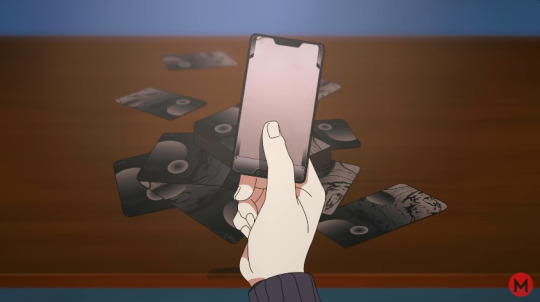

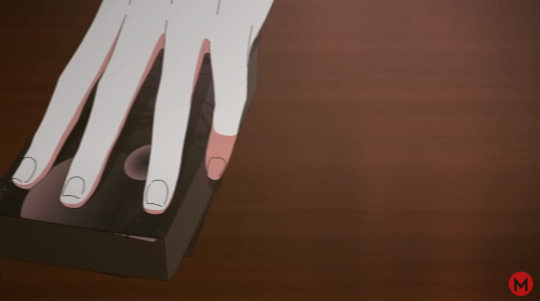
So first, we can be sure this is Aokoto because the lyrics not only use 'boku', but also express confusion at the situation, which only really fits the host.
Why am I [boku] here? It must be a mistake?
Take a good look at me [boku], until you find me
The truth will come to reveal itself
I won't forgive you if this is happening to me even though I'm right
Why am I [boku] here? It must be a mistake?
Take a good look at me [boku], until you find me
(Note: If there is no clarification on which pronoun is used when I put lyrics here, it's because the Japanese doesn't actually use any pronouns)
What's happening here? As stated, the tarot cards are a representation of destiny and their future. By drawing a tarot card, Aokoto is trying to understand his situation and destiny better. And by stacking the deck up neatly, he's trying to take control of his destiny, of his future. The desire to be free and be able to control his life is a very important part of Aokoto's character:
(T1) Q14: What will you be doing in 10 years?
M (Ao): I'd like to work independently and make my own design company. That way I'm free to do what I want.
(T1) Q8: What are your reasons for wanting to work for your current job?
M (Ao): I work at an advertising company that's at the top of the business world, you know? Just being able to get to that position is something to be proud of. I worked really hard to get hired there, too.
Aokoto places high value on the work he's done, because that shows how committed he is to having control over his life and his job.
(T1) Q12: How do you get to work?
M (Ao): I ride a road bike. It's a hobby of mine, and it's good to exercise too. I don't need to worry about missing the train, but that can either be a good or bad thing.
I've seen this answer interpreted a few different ways, but personally I believe what Aokoto's implying is that the freedom of not having to rely on the train is both good and bad. Essentially, he doesn't have to stress about missing it, but there's also no guarantee that he'll get to work in time without the reliability of the train. However, he still prefers the bike, because it gives him more freedom.
... Foreshadowing is a narrative device-
There's also the matter of the tarot spreads which appear in that "blank card" scene. There are two distinct ones:


Now, the whole mess is too complicated to get into here (and I actually am holding off from analysis until we get extra context from Double for that reason), but I believe one of these spreads belongs to Aokoto, and the other belongs to Midokoto (Secret Third gatekeeper alter). Which is which doesn't matter, because the card I want to focus on is the card in the "Hopes and Fears" position (EXTREMELY long story), which is I - The Magician (upright) in both of them. The Magician represents (among a fuckton of other things because tarot cards are frustratingly ambiguous by design) power, potential, basically the ability to achieve your goals. Thus, in the "Hopes and Fears" position, it would mean Aokoto wants to be able to control his life and fulfill his potential, and is afraid he might not be able to.
There is also the "Present" or "Self" card being the reversed XII - The Hanged Man. The Hanged Man upright represents (among other things) patience, the hope that as long as everything continues the same, things will turn out okay. Thus, reversed, it could be read as implying the querent is trying their best to change their situation, but are failing at it.
And this is where we get to the second part of the scenes I pointed out before. Because when Aokoto draws a card by itself, it's a blank card. In other words, no matter how much he wants to, Aokoto doesn't have full control of his future. I mean, obviously, right? He himself can't control his destiny when the other alters are also doing pretty impactful stuff. Depending on what theories you subscribe to, he may have ended up in Milgram without even murdering anyone, which is what I believe.
The same can be seen when he tries to put the deck back together. You might notice the deck there is actually thinner than the other time we see it.


He tries to "fix" or "arrange" his future, but he's "playing with half a deck", he's only half in control of his future. In this metaphor, the other alter(s) would have the rest of the deck, would control the rest of the system's destiny. Does that make sense?
Which gets us to the other alter who does tarot reading.

Notice the red mannequin there? The way 0 - The Fool's pouch of food is now a skull? And you can see this alter, heavily implied to be Orekoto, reads a Celtic cross spread with the Fool in the "querent" or "present" position.
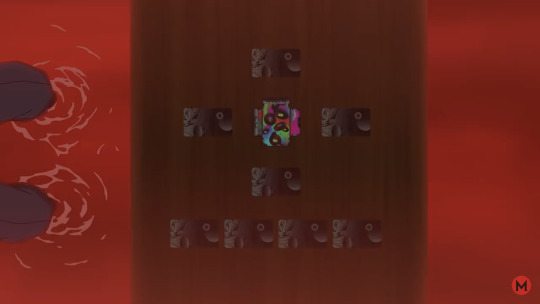
Thus, The Fool represents Orekoto, and he too desires control over their future. That's why he's reading the spread, the same way Aokoto previously tried to draw a card to check his future. And I think it's pretty safe to say Orekoto must have killed or attacked at least one person, which is his way of trying to secure a better future for the system. Protector alter and all that.
[Timelines]
Mikoto (Ao): Can you hear me talking like this? If you can hear me, then answer me. Why are you doing such horrible things? Hey. It's your fault things have become like this. ……Answer me!!
Mikoto (Ore): Ah, ahhh!! Because, I did it for my/your (Boku's) sake…! Because I/you (Boku-ga) would break apart!!
(Translation by Maristelina)
Plus all the other reasons to believe that.
That spread is a bit odd for many reasons, but one thing we can pretty much be sure of is Orekoto's "Hopes and Fears" are represented by VII - The Chariot.
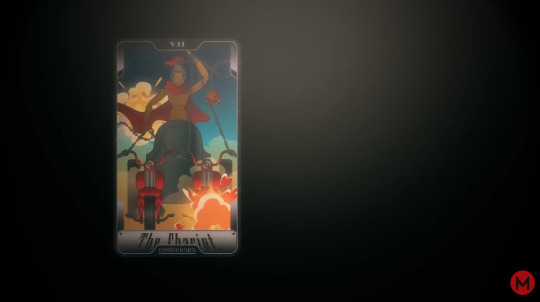
The Chariot (among other things) represents strength of will and control, basically think of it as a more forceful version of The Magician. Thus, Orekoto also hopes he can take control of their life, though he does it through force, and he fears he might be getting too forceful.
If I could laugh, if I could go back
I'd play dead even though I'm alive right?
If I could end, if I could stop
How long would this dream go on?
Assuming it is Orekoto singing here (no pronouns so), it seems he doesn't want to kill, but sees himself cornered, like he has to kill. If he could stop, he'd "go back and play dead even while alive", he wouldn't kill anymore. But when he feels "boku will fall apart", he tries to save him through any means he can, which is likely murder. The exact reasons are as of yet unknown (someone stalking them, stress, could be a lot of things), but that's the idea.
However, you tarot enthusiast might notice a few interesting differences between this Chariot card and the actual Chariot card. This is important, because the meaning of these cards comes from the images, so when the image differs (apart from stylistic choices obvs), the meaning differs with it.

First important difference: the real Chariot has lions, MeMe's Chariot has bikes. This again relates bikes to the idea of freedom and one's own will.
Foreshadowing is-
Second; MeMe's Chariot has the protagonist swinging around a mace, which the real Chariot just has a wand. I frankly don't think this means anything other than MeMe's Chariot explicitly references murder rather than other, non-physical forms of strength and force.
Third, an important part of the real Chariot is that the man doesn't hold a leash on the lions, he controls them through force of will, apparently. Meanwhile, the mannequin in MeMe's version does hold chains to control the bikes, which again I believe simply implies a more forceful and direct version of the meaning. Orekoto doesn't trust his destiny to guide the system in the right direction as long as they're strong enough, he feels he needs to have more direct control.
And finally, the lions in the real Chariot are fine, but in MeMe's version, one of the bikes is fucking exploding.
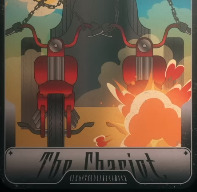
So what the hell is up with that? Well, let's keep in mind what I said before. Aokoto also wants control of his life. So I believe in a way these bikes represent Aokoto and Orekoto's actions. One of them Orekoto has direct control over (he controls his own actions, after all), while the other is getting hurt by Orekoto's control. Orekoto may want nothing more than to protect the system, but the way he does it is harmful to Aokoto and destroys the control he wants to have over their life. I mean, it landed them in Milgram (according to some interpretations), and it's not like Aokoto likes the murder.
(T1) Q6: Tell us what you hate.
M (Ao): Staying up all night working / reptiles / violence
[Double Preview]
Hey now, I [ore] saved you right?
So why in the hell are you crying?
(I will use the preview as evidence, watch me)
Temporary CW for abusive relationships and rape (Mono Poisoner)
This idea of "love" that hurts the other is also implied by Mono Poisoner, their Trial 1 cover. Though to be clear, Orekoto is not anywhere near as awful as the protagonist of Mono Poisoner, since he isn't intentionally hurting the rest of the system, and obviously isn't actually abusing the other alter(s).
“She belongs completely, entirely to me!”
Kissing, sleeping together, everything beyond that too
No one can hope to cut this connection between us
After brandishing that poisonous desire to monopolize and having erased YOU completely,
It seems like it can be easily embraced, the entirety of that heart
“YOU best not get carried away!”
Taking out the really violent and abusive elements out, this does vaguely fit the idea I'm trying to get across.
Temporary CW over
Anyways, the point is that Orekoto wants control over their life, but is accidentally harming Aokoto by taking away his agency.
There is more symbolism of this ‘drive to control destiny’ in the moon which consistently appears throughout MeMe.
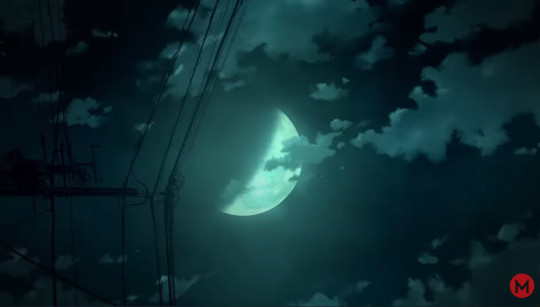

As you can see, it’s in the first quarter phase. This is halfway between the New Moon which represents the beginning of a journey and the Full Moon which represents the end or rebirth, and because of that, it can represent a difficult time where decisions must be made, a point where strength of will is necessary. This again fits both of Aokoto and Orekoto, since they’re both making important decisions for their future. Hence also why the moon is half and half, the future is being decided half by Aokoto, half by Orekoto.
Alternatively, you could read it as only Orekoto making decisions, with the other 'half' being "left in the dark" because Aokoto doesn't know what Ore's doing. That would explain why the moon only shows up in relation to Orekoto in the internal world and the murder scenes.
Heavy speculation incoming (more than before anyways)
But hold on a second. I said before the upright Hanged Man, the card on Mikoto's shirt through most of MeMe, is about patience and not doing anything to change their situation. This is somewhat contradictory to The Fool, which is all about new opportunities and taking new risks (long story), and is obviously contradictory to the reversed Hanged Man because that's how tarot cards work. Because of that, and everything else I've been saying, it feels like the upright Hanged Man doesn't really fit either Aokoto or Orekoto.
Which is why it's so convenient we have a third (plot-relevant, there may be more) alter who does want their life to continue as is, isn't it?
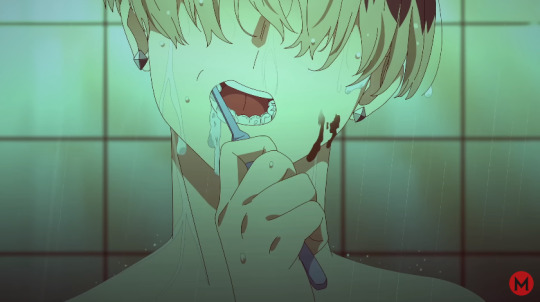
The minus energy that I swallowed
Hugged me [boku]
Maybe it's okay to try to keep on living
Split in half,
Make that heart beat
This scene is very clearly connected to the aftermath of a murder, and shows an alter that has accepted the "negative (minus) energy" of violence. However, the use of 'boku' rules out Orekoto as the singer. Thus, we have ourselves our favorite Secret Third Alter, Midokoto. And Midokoto says, filling in the blanks, that ‘maybe it’s okay to keep living [like this]’, as long as they ‘split in half’ to ‘make that heart beat.’
Before we continue, I have to address that yes, I believe Midokoto is represented by the upright Hanged Man, even though he’s the only alter who’s never seen wearing the shirt. Either his back is turned, he’s shirtless, or straight up has a completely different shirt. However, I actually think this makes perfect sense.
It’s widely accepted that if Midokoto exists, he’s likely a gatekeeper alter who co-fronts most of the time, meaning he’s still aware of everything that’s happening even while he isn’t controlling the body (<- simplified version, read more if you’re interested [alter roles] [co-fronting]). Therefore, he’s a constant in Mikoto’s life, and it makes sense for him to always be present in some way as long as any alter is on screen. He’s on the shirt when the other two are there, so when the shirt isn’t there, it’s because the ‘upright Hanged Man’ is the one controlling the body. Does that make sense?
I should note, Mikoto’s version of The Hanged Man includes a bunch of eyes on the background.
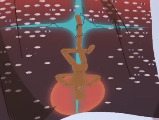
Which fits the idea of Midokoto overseeing everything in the others’ lives, and for the inverse in Aokoto’s case could also be interpreted as societal pressure, long story.
Yes, Midokoto's celtic cross spread has the reversed Hanged Man in the middle of The Wheel, but let’s just say that means ‘present’ rather than ‘querent.’ Yes, there’s a Fool portrait in the background of that one scene, I swear there’s an explanation but it’s too long to get into here.
Point is, he’s the one who wants their life to continue as is, and thus the one who fits the idea of ‘patience’ that The Hanged Man (upright) embodies.
But make no mistake. He still has The Magician as his “Hopes and Fears” in the spread which represents him, meaning he does yearn for some control and fears not having the means to achieve it.
However, I believe the type of control he’s looking for is different from the other two. See, while Aokoto wants freedom and control over his life in a more conventional way (good job, free movement, independence), and Orekoto wants control in a ‘no one will stop “I/you” from achieving what “I/you” want’ kinda way (aka safety), Midokoto wants control over the system, not the rest of their life. He wants to keep Aokoto and Orekoto ‘split in half’ because that’s how they can both live as they please, it ‘makes their heart beat.’
That’s why the moon that represents decision-making is split in half. That’s why there’s only two bikes in The Chariot card. That’s why Midokoto never bothers to read a single tarot card. Because the ones deciding where their life moves are Aokoto and Orekoto, all Midokoto does is keep things running smoothly. Though of course, this is all just my interpretation.
In fact, you can even tell based on what we believe each alter to do. Aokoto does the day-to-day work, making sure he has the opportunity to achieve his dream of working independently in the future. Orekoto deals with threats until the system as a whole is safe, which includes throwing away evidence so they don't get arrested. He does a dogshit job at it, yeah, but he's trying.
However, once they get into the apartment, when the external threats have been dealt with, the one who bathes to make sure Aokoto doesn't learn of Orekoto's actions, the one who keeps their lives metaphorically 'split in half', is Midokoto.
Heavy speculation kinda over
So, where were we? I said this was inspired by the Double thumbnail, didn’t I? Well, yes, even if I have very little to say about it in relation to this post. You could say I kinda, uh, went off the rails a bit (<- I am immensely unfunny)

As I said, he’s on a train. And with all the stuff I mentioned before about how bikes are associated with freedom for him and stuff, it makes the imagery of being stuck on a train with the victims (I assume that’s what the mannequins represent, I’ve seen other interpretations) a lot more interesting.
Think about it. When you get on a train, you made the decision to enter it, but you don’t have control over where it goes. And that’s what’s happening here: the alter on screen is in for the ride, and he feels there’s nothing he can do to alter the course. It’s like a railroad.
Aokoto didn’t get on this train. Obviously the scene is metaphorical (otherwise who left their mannequins in the goddamn public train), but we know Aokoto doesn’t use the train. However, he’s on it now, alongside Orekoto who is probably the one fronting here? I assume, given the red light in the background. In my mind it would make sense for the thumbnails to be Aokoto T1 -> Orekoto T2 -> Midokoto T3, but that doesn’t have to be the case.
What I’m trying to convey is the symbolism of the system being stuck in a set path, a set destiny, caused by a decision not made by Aokoto. And if Orekoto is really the one fronting or being represented here, he’s miserable because of the path his actions have landed him on.
If I could break it, if I could change
Can I do it, I wonder from when I started to give up
He’s ‘given up’ because he’s accepted he’s ‘on the train’, his path is already set and he can’t change it (“if I could change”). Yes, give me that Orekoto angst!
Anyways, please keep in mind this is all my interpretation of the symbolism and all of this is extremely subjective, especially with how confusing Mikoto's entire story is. I hope you forgive my brainrot at seeing a guy take a train. Take care!
84 notes
·
View notes